#or hold any awareness of the fact that he is indeed In A Narrative
Text
GALLIFREY: TIME WAR: HOMECOMING: This hole was made for me:
Rassilon's death cult and the Dalek's apocalypticism, the religious fervor mounting as they spiral towards each other. "There is no CIA anymore, only me" (the mix of cocky and pathetic & the awareness that Narvin could simply regrow the CIA from himself like he’s a plant cutting, but that this version of him very probably won't...There He Is My Weird Little Man). Eris' skeletal battle TARDIS. Leela, again, jumping into the void with the most fragile of tethers because that's what she does, she saves who she can, even if it's Romana, especially if it's Romana.
Tell me again how you're not a traitor. The Daleks using null space because of course they do, the War can't be stopped that easily. Narvin staring his whipped-dog fear in the face as Rassilon takes over the ship. Leela doesn't need Narvin to ask her to protect Romana but the fact that he does is very.....and she's gonna take that responsibility maybe a little too seriously, isn't she. Narvin asking to hold Livia's hand as they die is the sweetest and saddest thing. Sentimentality indeed.
In the beginning was the word: Romana, who has spent the entire series trapped between her trauma from Etra Prime and her devotion to/obsession with/self-destructive, is it codependency if the planet is slightly psychic, whatever with Gallifrey, & also the possibility of elsewhere Dr Who and Brax represent - Romana, having been pinned beneath all that history and re-enacted trauma, now imprisoned in the Matrix archives as Daddy God King Rassilon re-writes the world. i am chewing on my keyboard ~
Livia remains low-key one of the more intriguing, complex characters in DW. i’d love to know what the fuck her deal is
Speaking of Trump analogues: Mantus trying to sell out to the Daleks is very Chris Noth in "Revolution of the Daleks".
DW's optimism and BF's endless content ethos aside....you could kill off Narvin right here and it'd be fine, narratively speaking.
may or may not ever write anything coherent about TW 🤝 Flux but like. This series has been about trauma and imperialism and how the system will crush you or mold you or just spit you out, and about destruction as a devotional act, and history as a cycle, and the collapsing of institutional into familial abuse. not saying it’s perfect but when it works oof ouch does it work
i am. hmm. wary, of War Room presumably picking up Leela's guilt at being a collaborator bc with Big Finish that could go any which way but like imagine if they don’t fuck it up...society_if.png, etc
#the conga line over rassilon's grave#dr who#big finish gallifrey#gillian welch was right; time really IS the revelator#current unofficial ranking s4 > TW > s5 > s2-3 > Enemy Earth > s1
8 notes
·
View notes
Text
The Quackity Meta: a Tale of Two Absolutes
More than anything else, Quackity wants control, and to never, ever lose his own autonomy. And that is why he despises Technoblade.
But wait, how is Technoblade a threat to Quackity's autonomy? Techno is all for individual freedom! He wants to eradicate the government so that no one can be controlled!
There's the question though... How do people exercise control within the framework of a video game like m/inec/raft?
“a person exercising power or control in a cruel, unreasonable, or arbitrary way.”
Power on the Dream SMP cannot be translated one-to-one with real life power. In real life, yes, a government had infinitely more power than an individual, for numerous reasons. But on the Dream SMP, the government's power is always directly tied to the power of the individuals who are willing to defend that power.
Technoblade is powerful. This is not debatable. How he uses this power, historically, has been a mix of generosity and self-interest*, although primarily the latter.
Generously, He gains resources and then distributes them to his allies during the Pogtopia Rebellion, gearing everyone up and giving them a fighting chance against Dream. However, in the aftermath of Tubbo's being appointed president, Techno turns on them, swiftly and mercilessly. The moment that it becomes clear** that Pogtopia's interests don't align with his own, he crushes them with the aim to prevent them from ever recovering.
( *I use self-interest as a neutral term here. Everyone on the SMP is selfish to some extent – it doesn't make them evil, and in fact has been treated as a positive at times, as well as a negative.
**I want to note that whether or not Technoblade knew of Pogtopia's goal of reinstating the government is unclear. It would seem that from Techno's POV that he didn't know, or assumed that it was a minority who wanted another government. But on the other hand, no one was actively lying to him about their intent, and people like Tommy and Quackity made their goals very clear. Further doubt is cast on the idea that Techno had no idea when you take into account that he enchanted the Netherite armor in the vault with worthless enchants like Fire Res.
Ultimately, there's no way to know until it is confirmed by cc!Techno himself, and it doesn't pertain that much to this analysis, but I'm aware that it's a hotly debated topic so I wanted to address it.)
It can be argued that Techno's destruction of L'manberg, both the first and especially the second time, was necessary. It can also be argued that it was cruel and a disproportionate retribution against both culpable and innocent parties. Extant of these arguments however, how does it feature into control?
Well, we can’t talk about control without mentioning the most controlling force on the server and the other person on Quackity's hitlist, Dream.
Dream is a tyrant. I don't think anyone can really make an argument against that in good faith at this point. He ticks off every box, no matter how vague or esoteric. This makes the interactions that Quackity and Techno have with him very interesting.
Quackity despises Dream. He's one of the earliest adopters of the hating-Dream-train, to the point that some people have compared him to Cassandra, a priestess who was cursed with the vision of prophecies that would always be true, but never believed. And indeed, Quackity's apprehension of Dream comes in as early as Pogtopia, and grows at a steady pace after the fact.
But despite his rightfully calling out Dream's hypocrisies and his controlling tendencies, Quackity was largely ignored on this front, especially when the time came to exile Tommy and Quackity basically predicted the next arc – If they gave Dream this concession, they would never be able to get out from under his thumb. Flash forwards to the Green Festival, and the moment Tubbo hands over the discs, any illusion of nicety drops and Dream proceeds to destroy them, side by side with...
Technoblade has always had an amiable relationship with Dream. From their first proper interaction on the server being Dream giving Techno some hefty resources, to their snap team-up on Doomsday, they've had a smooth time, with some notable bumps.
Techno fought against Dream during the Pogtopia rebellion, but when it became clear that Dream was more invested in chaos than his other allies, Techno temporarily allied with him to summon the Withers and drive the nail deeper into Manberg’s coffin.
The only time Techno has really bothered to challenge Dream directly is when he came for Tommy in exile. Techno went to great lengths to protect Tommy, hiding him and distracting Dream.
He did give Dream the option to call in his favor and take Tommy, but there are arguments to be made that he did this more as a challenge – that Tommy is worth the favor. Again, we probably wont ever know.
The difference in their relationships with Dream is polarizing. It also reflects the difference in personality – Quackity is an aggressive, ambitious person, whereas Techno leans more towards passivity and caution. Quackity is looking for enemies to challenge, where Techno is avoiding them, people who actually stand a chance against him most of all.
Technoblade is an individual with extraordinary amounts of power. Others have pointed out that he is rarely challenged by other characters or the narrative, and regardless of the merits or flaws in that, it paints him as nearly untouchable. His being in the good graces of Dream only adds to this.
And like with Dream, the only way that people have been able to threaten Techno is when they work together. The Butcher Army, for all it's flaws, managed to capture Techno through numbers – with Tubbo and Fundy (barely) holding off Techno's blood rage while Quackity snuck off to take Carl hostage. And they would have gotten away with it too, if the other most powerful person on the server hadn't stepped in – both by pointing Techno to a totem of undying in the days before the attack, and by getting Punz to cause a distraction and directing Techno to the final control room, where he could escape with Carl.
So, if the most powerful person in the world can only be threatened by people working together, and the most common form of organization is by government, then what does it say about Technoblade, who wants the government destroyed?
People like Tubbo, Fundy and yes, Quackity, all benefit from organizing and working together. They all tend to be less armed, less ready to defend themselves, and completely unable to stand up to titans like Techno and Dream on their own. It's safety in numbers, but it's also control, and control is power.
Ranboo's insistence that Snowchester is a Government is interesting when viewed through this lens. Ranboo is another person who is insanely rich, and able to defend himself and his belongings consistently. Ranboo doesn't need other people to defend him – he's living with Techno and Phil not out of necessity for his survival, but out of need for connection with others.
This seems to be the main difference he finds with Snowchester, which has a more structured environment, geared to defend itself and it's people, if harm should come their way.
Which makes sense, considering it's founder, Tubbo, holds no earthly belongings, and Jack, another prominent member, has made a character trait out of losing his things every other day. The two of them have no conceivable way to defend themselves against people who are stronger than they are. But together, holding the keys to nuclear armaments, they can suddenly play on the field of gods.
The anarchist commune, despite having all members working together and being on good terms, aren't really an organization, they're individuals with common goals and interests. They don't need to live together to be strong, they're all already strong, they choose to be near each other because they want to.
Snowchester is not a government and has no ruler, but together, it's members hold power. They have sway in the world when they work as a collective, and most members have a vested interest in keeping themselves and each other defended because of this. Consequently, the “identity” of Snowchester becomes more prominent, resulting in the flag, the uniforms and the, well, identity.
(Now, the more perceptive among you might have noticed that I basically just compared Techno Phil and Ranboo to the ultra rich 1%, which. Um. Is a pretty serious comparison to make about in a block game rp?
And I wanna say that I don’t think this was necessarily intentional on the parts of either the CCs or the characters, and beyond that, it’s just one way of examining the text. This analysis is by no means the “Right” way to view the story, just a different one.
Regardless...)
Techno uses his considerable power to further his own goals, first and foremost. This is not inherently good or evil, it just is.
Contrast with New L'manberg's cabinet; Four people, pooling their limited power to further their shared goals. Not good or evil, just a way of exercising power.
But power is not static. Power is fluid and changing, moreso now on the SMP than ever before, and Quackity and Technoblade are fighting to define what Power means going forwards.
Techno is fighting for the status quo, knowingly or not. Individuals with power should lead the world, and those without should strive to emulate their betters. He destroys all forms of government, which strip away the rights of the individual in exchange for hierarchy and consolidated power within that hierarchy.
At it's best, this is a very freeing ideology, where nothing and no one can hold back the individual. The world is your oyster if you are willing to work for it.
But at it's worst? “Violence is the only universal language,” is the key phrase. Where does this ideology leave people who aren't strong? Where does it leave those who cannot fend for themselves? If Violence is the only universal language, then the weak have no means to speak.
Quackity is fighting to get a foothold for a contrary ideology – One that prioritizes words over violence and offers alternative methods of gaining and exercising control, such as through currency and conversation. Quackity has tried to varying degrees of success to implement this on the level of his own individual power, such as during the elections, but his attempts at employing this on a grand scale have all been short-lived.
At it's best, this ideology can uplift anyone, regardless of their strength. It encourages more communication, more commerce, and thrives under, you guessed it, strong government.
At it's worst however, it creates a brutally controlling environment. Where a few people gain absurd amounts of power through the complex machinations of a fiat currency, and are then able to use their sway and influence with governing forces to exercise power that they would never be able to hold on their own.
Again, neither of these ideologies are inherently good or evil. They both have flaws and benefits, and benefit no one more than perhaps Techno and Quackity respectively, while hindering the other.
Techno is benefited by anarchy because he holds incredible amounts of individual power. He is the strongest person on the server, he is rich beyond anyone's wildest dreams, and on a meta level, he's straight up good at the game. The current status quo puts him firmly at the top of the food chain, and this is most obvious on Doomsday, when he and the other two most powerful individuals (Dream and Philza) come together and crush the combined forces of New L'manberg. They are not meaningfully challenged in any way, whatsoever.
Meanwhile, Quackity is deeply hindered by the current status quo. He's not strong, he's poor, and he's vulnerable to anyone who wants to bully him with brute force. On a meta level, cc!Quackity just straight up does not play m/inecraf/t as much as some of the other people that on the server. (To be clear, I do not mention that as a criticism, just to contrast Techno. Neither of their levels of play are better or worse for content, they just add to the experience differently.)
On the other hand, in a government? Quackity “Law Student” HQ is suddenly on top. He's charismatic enough to debate with Wilbur “Can Talk His Way out of Anything” Soot during the elections, and come out of that arena smelling like roses. Back during the days of El Rapids, Quackity held his men back from conflict with Dream, and talked him into a corner of technical truths where Dream had to concede that he viewed El Rapids as an independent nation if he wanted to get involved with their conflicts.
And Techno, while he is brilliant and an English Major, suddenly loses a lot of his intimidation factor if he has to respect laws preventing brutal murder. Techno can certainly debate, but his go to conflict resolution is usually violence, and if you take that away, you take away the threat of challenging him. Because make no mistake, challenging Technoblade right now? Is suicide.
And this duality, this grey morality and clash of ideals, is why Quackity is my favorite character on the SMP. He isn't strong. The power he holds is tenuous and balanced on a knife's edge. It would make more sense for him to stay quiet, keep his head down, and if anything, try to change things from the shadows, where he'll be in the least danger.
But he isn't quiet. He doesn't just challenge authority, he challenges the authority; Dream, Wilbur, and of course, Technoblade.
And in all but one of those matches, he's come out with a concession from his enemy gripped between his teeth. He schooled Wilbur in the debates. He forced Dream to grant El Rapids Independence at a time when he hadn't done so for New L'manberg.
But he failed miserably when he challenged Technoblade. Quackity lost that fight in the final control room before it began. He lost the moment he formed the Butcher Army. He would have lost if he managed to kill Technoblade, and he lost still when he died.
He lost because he conceded that the only way to achieve his goal was through violence. He decided that the only way to establish himself and New L'manberg as powerful? Was to kill Technoblade. And he lost that fight and he always will. There was never a way that he walked out of that fight with the victory; Quackity lost the ideological battle long ago.
But not the war.
As of writing this, Quackity is in the process of introducing an economy to the Dream SMP, on Sam's initiative. There is no action I can think of that is wiser for him to take right now. Now, when Dream has been deposed and there's a vacuum in power; Now, when people are getting tired of endless violence and the loss it brings; Now, when people are looking for something new.
An economy is a direct challenge to Might Makes Right. Trading, supply and demand, politics. It offers a new way for people to obtain resources and a direct alternative to brute force; other methods to pay for slights and breaches of honor and etiquette. No more will pet wars be fought with iron swords and shields, but with money! A healthy sum of cash for the murder of Fungi!
If Quackity can get this system off the ground (and with Sam's help, he definitely can,) the stage would suddenly be tilted in the favor of not just Quackity, but the people who he has associated himself with most closely – Tommy, Fundy, even Schlatt. They're all business men, all scammers. This could be Quackity's world, and he's damn well intending for everyone to live in it.
We’ll have to see what Techno thinks of this - Quackity hasn’t made any moves to start another government, and an economy doesn’t inherently contradict anarchy. But it does hold a potential threat to Techno’s current power.
And as for Quackity? What will he do once he’s at the top? Will he finally become a true tyrant? Will he usher in a new age of equality and justice? Or will he eschew all of that in favor of personal riches. For once, the cards are in Quackity's favor, and we might get the chance to see what he does when he holds real power.
#Dream SMP#Quackity#Technoblade#Ranboo#Dreamwastaken#Dream SMP analysis#lazytext#long post#its done its done i did it its done#ive been working on this for THREE WEEKS#THREE WEEKS OF CHECKING VODS AND WIKIS AND AAAAAAAAAAAAA#If theres typos I DONT CARE#I LIVE MY LIFE AHAHAHAHAHAHAHA
468 notes
·
View notes
Text
What Does It Mean to Save?
I keep seeing it said that Deku, Ochaco, and Shouto will “save” Shigaraki, Himiko, and Dabi, but that there will be no redemption and/or no survival for them. I’m truly not trying to vague these posts and everyone is entitled to their opinion, but literary criticism is fundamentally responsive so I’m writing this anyways.
I personally think that’s not BNHA’s definition of saving nor of redemption. So here, have a deep dive into literary tropes related to redemption, genre, and character arcs as they pertain to BNHA and the question of: what does it mean to save Shigaraki, Touya, and Himiko?
Before we begin, let me say that while we might be personally uncomfortable with redemption (there’s a redemption arc in BNHA I am personally quite uncomfortable with), that doesn’t inherently mean the narrative won’t go there. The key principle I’m operating on here is BNHA’s message that heroes save people. It’s held up as the highest ideal.

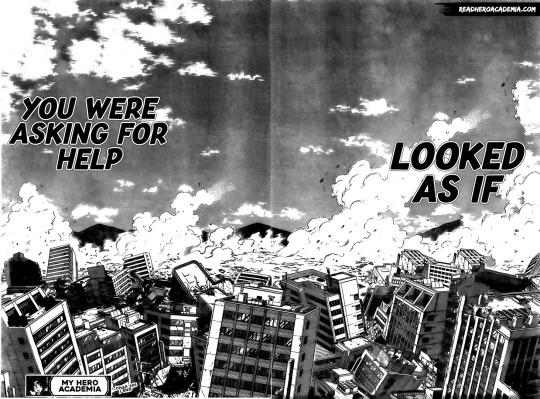
So let’s talk redemption in BNHA-verse. With this guy, whose redemption arc I dislike in principle but accept as part of the story so don’t come for me stans and/or antis. I’m analyzing because it shows us what redemption means in BNHA-verse, whether or not that is satisfying to you personally as it fits/does not fit with your own morality/philosophy.
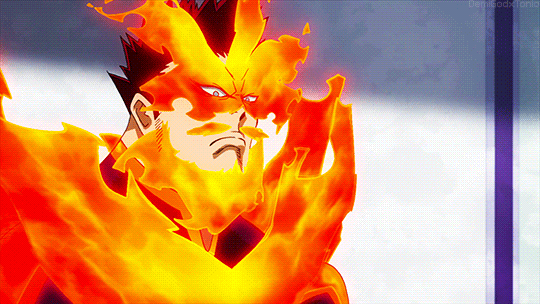
If Endeavor can be redeemed and live, and he’s Bakugou’s negative foil, I highly doubt Shigaraki and Deku as well as Touya and Shouto and Ochaco and Himiko will be any different. Why? Because Enji is an adult character. The others--well, Himiko’s age we don’t know, but we do know that Shigaraki and Dabi are technically adults. But does the story consider them adults?
(It doesn’t.)
Child-coded characters are generally more likely to survive a redemption, which I’ll explain more later. First I have to define what I mean by child-coding, because I DO NOT mean this in the way it’s often (mis)used in fandom wank. Child-coding is a real thing, but it is not done to infantilize and it has nothing to do with shipping.
Child coding frames the character as a child for a few narrative purposes to convey a story’s theme or purpose. For example, if it’s a coming of age story coding a character as a child even if they legally are not emphasizes their journey to an understanding of self-actualization, or a true understanding of self with self-awareness and an understanding of self-value. An example of an adult coded as a child is The Kite Runner, wherein Amir is a legal adult for half the story, even married for fifteen years so we’re talking 30s-40s, but he does not truly become an adult until he returns to his homeland and takes responsibility for a childhood sin. In Attack on Titan, the main characters are now nineteen, but are still struggling to take responsibility as adults and have only started doing so now that their mentors/parental figures have started dying.
Along those lines, in any kind of story, you can code a character as a child of someone, regardless of biological relationship, to convey the type of relationship they have (usually a mentor one). For an example of this, see Bungo Stray Dogs’ Dazai and Akutagawa. Despite their two year age difference, Dazai recruited him to the mafia, abandoned him, and Akutagawa desperately seeks his approval. Usually in these stories a character will “overcome” their parental figure. This can be done through overcoming their need for the parental figure’s approval in stories where the parental figure is kindly (such as in Harry Potter, when in the final book Harry, Ron, and Hermione leave the Weasleys to find the Horcruxes despite Mrs. Weasley’s please) or through like, killing/stopping/leaving the parental figure when they are abusive (see fairy tales like Rapunzel and Cinderella). The parental link to self-actualization is because it is childlike (and a part of actual psychology that is reflected in literature) to see yourself as a part of your parent; self-actualized person would see yourself as a distinct person from your parent, but also acknowledge the ways in which they’ve shaped you.
So, how do you code a character as a child? BNHA isn’t subtle about it, because Horikoshi seldom is subtle about anything. The villain trio are all coded as children.
Shigaraki Tomura:


Who cannot achieve self-actualization so long as AFO has access to his body, as he’s literally trying to possess him. He’s trying, but it’s not gonna work because Shigaraki can’t keep AFO and become an adult at the same time. It’s a choice the narrative is setting up: your dream of destroying, or your freedom? (To get the latter, he’ll probably have to destroy AFO).
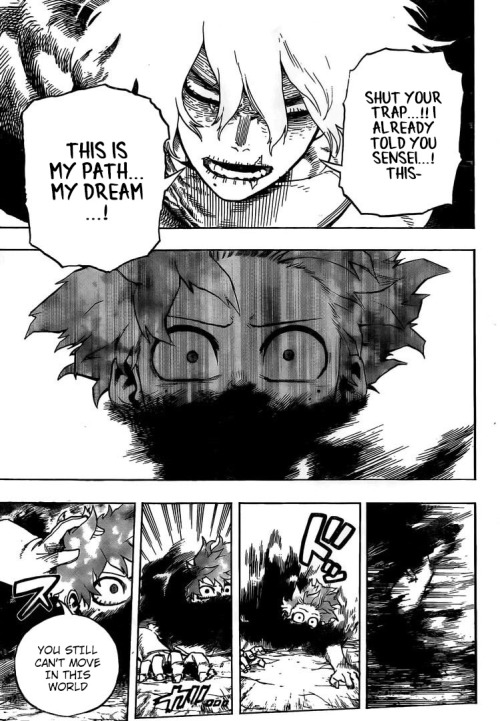
Todoroki Touya, who is repeatedly emphasized as a small child when compared to his siblings, and yes, I know he’s now tall. Specifically he’s spotlighted as the child of Endeavor:
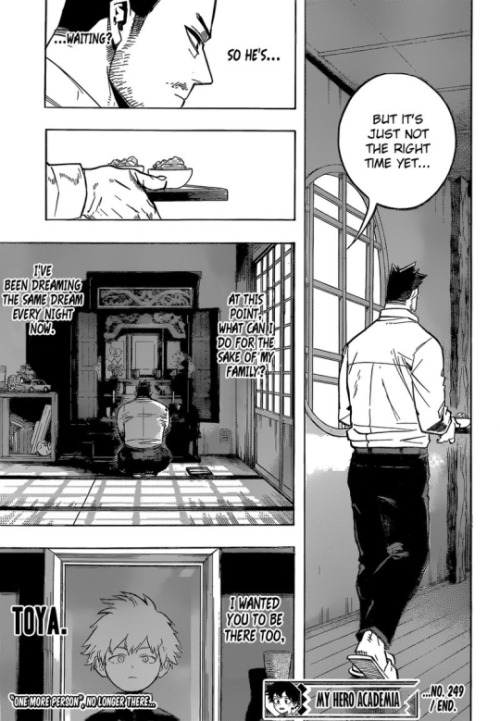

And he’s the least self-actualized one in a lot of ways, contradicting himself constantly. I’m not Endeavor, DUH! But these are Endeavor’s flames! He’s gonna have to choose one or the other, because the tragic irony is that the more he takes out his rage on those around him, the more like Endeavor he becomes.
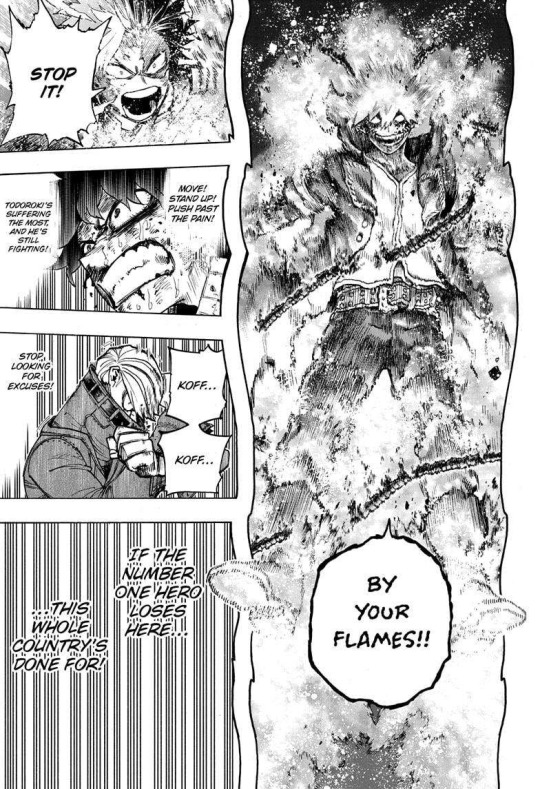

And Toga Himiko (who might well literally be a legal child), who is actually the most self-actualized one thus far, because she rejects Curious’s child insistence (Curious holds her in a Pieta pose, based on Michelangelo’s statue wherein Mary holds a deceased Christ):

She’s still got, like, a way to go though:

Because Himiko also wants to be like the people she loves to the point where she loses her own identity in them, which is er, not self-actualization. So she’ll have to choose whether or not she really wants to be like the people she loves or whether she wants to live her own way, which she herself tells us how that would end (death):

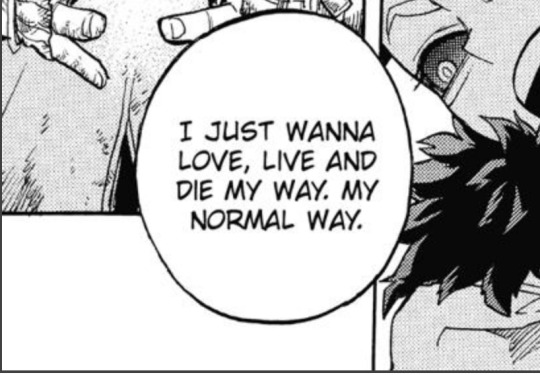
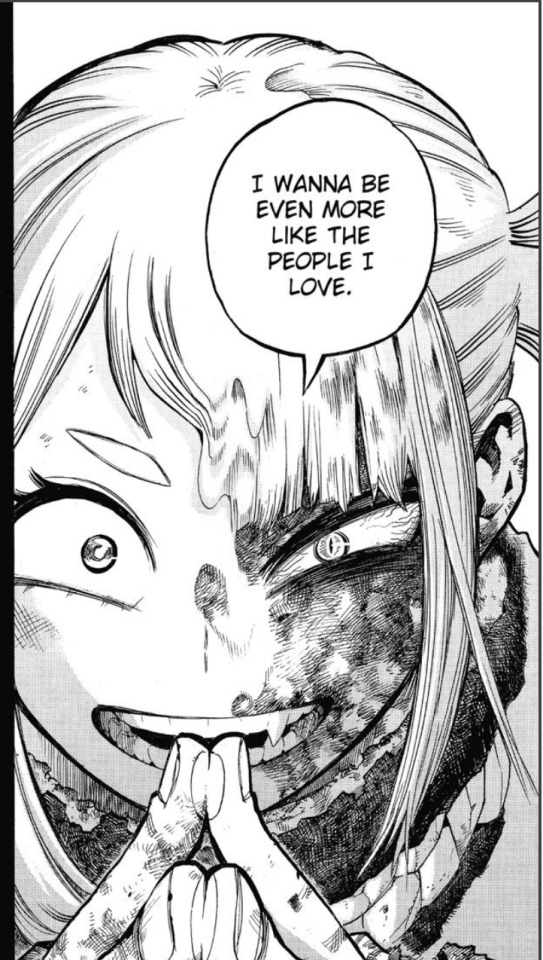
Deku said it himself: it’s good to focus on what someone is doing now. And look, I have issues with this statement and how it’s framed. I’ve talked about it at length and it was doomed to fail because Shouto himself told us long ago that it was annoying to hear a righteous speech by a stranger when you hadn’t gone through the same, plus Endeavor kinda failed by choosing being a hero over a dad here. But, the principle is that if the past doesn’t preclude Endeavor from seeking a better self, why would it preclude three characters coded as children, one of whom is literally somewhat the product of Endeavor’s sins? BNHA doesn’t think the past keeps someone from a better future.
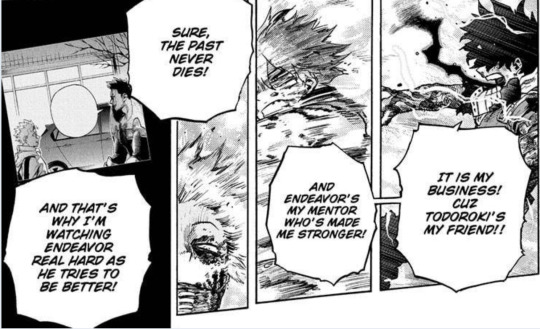
So what about Dabi’s counterpoint, which is indeed valid? Well, redemption doesn’t mean the past forgets, either. It’s complicated and nuanced, and we can debate how well Horikoshi strikes this nuance (it’s got its flaws), and admittedly I don’t know how this will go down in the future. But it is asking Endeavor: how do you redeem yourself to the people you’ve hurt? And we have Endeavor asking this question to Touya’s shrine. I mean, the foreshadowing is obvious. Endeavor has to redeem himself by trying to save Touya. However, it will still probably come down to Shouto to save Touya.

For our three villains, it’s a little harder to predict... well, sort of. For Shigaraki it’s extremely obvious: he has to help take down AFO. Dabi probably has to do something to help his family (siblings probably), but it’s vague. Toga needs help and not condemnation, but presumably she’ll help Ochaco with something.
So, is this redemption? I’d define it as redemption in the eyes of the narrative. To address what makes a redemption is another essay unto itself, but if we bring in the oft-compared Star Wars example: did Darth Vader get a redemption? Did Ben Solo? Everyone says yes to both. However, only Luke witnesses Vader’s redemption, and only Rey Ben Solo’s. So the rest of the galaxy? Doesn’t think so. When I say they’ll be redeemed, I’m defining it as their role in the eyes of the narrative, not whether or not society will accept them or even whether their victims will forgive them (of note, in canonical novels, Leia never forgave Darth Vader despite learning he was her father and obviously knowing Luke’s account of his redemption was true).
So, redemption in a narrative doesn’t mean all of society has to forgive and accept them. Dabi has still like, murdered 30 people--many of whom were thugs, but he himself acknowledges they didn’t deserve to die. Additionally, he himself also acknowledges that the families left behind--their feelings matter:
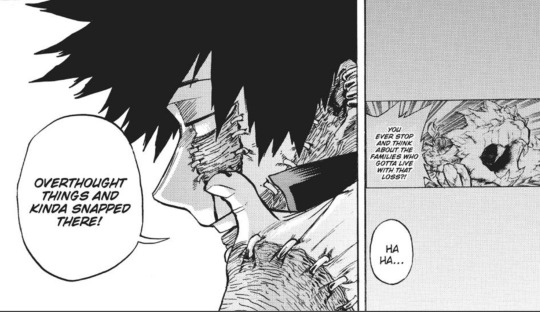
But why does that mean they have to die? Why even does it mean they have to languish in prison forever? (If there’s even a safe prison at the end of BNHA which I kinda have doubts about.) Heroes have also killed: see Hawks as Exhibit A. In fact, some people want revenge on the heroes precisely because they arrested or killed their loved ones (jail isn’t held up as a rehabilitative place in BNHA’s world. In most countries it isn’t in real life, either, but again that’s for another essay). So why don’t the League’s feelings on Twice’s death matter just as much as the feelings of unnamed and unseen (and thereby less important narratively) characters?
Additionally, regarding death... the villains routinely get called on their death wishes. Himiko’s determination to decide how/when she dies is called out because this is right before Twice overcomes his trauma to save her, and the next arc they appear in is when Twice dies trying to save her again. Dabi’s suicide wish keeps him from getting close to others, and it keeps getting thwarted. Shigaraki’s obsession with destruction and death is clearly not a good thing, and his rejection of his family’s desire for them to join him in death this past arc is growth.
In other words: what Dabi said and what Snatch said about families and how they feel matter for the villains too. The villains are their own weird found family (Dabi as the deadbeat prodigal brother of both his families). Their deaths--Magne’s and Twice’s thus far, and I’m not ruling out further deaths in the future--affect the others. People’s feelings on losing loved ones matter. The villains are people, as Himiko said herself this arc:
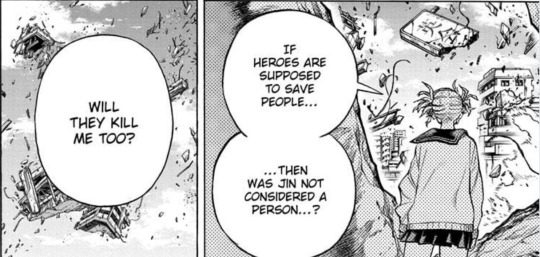
Their feelings about each other matter:
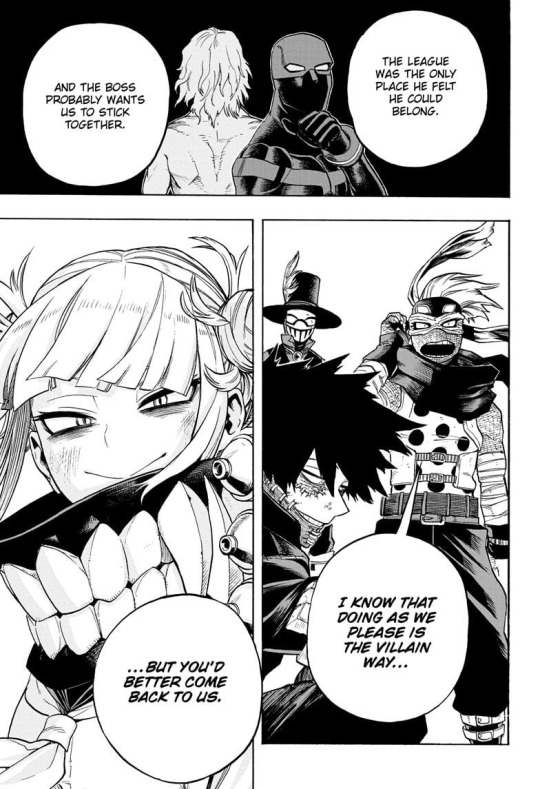
How would Touya dying affect the Todorokis? At least they saved him spiritually, I guess, but that’s absolutely lame narratively, and if you have Enji eventually do a sacrifice to save Dabi (pretty likely, even if I personally think Enji will survive said sacrifice) then what’s the point of Dabi dying? How would Himiko dying affect society? As a martyr like Curious wanted her to be, even a redeemed one? A tragic warning story? What even is the point of Ochaco saving her if that’s the case? If Shigaraki dies, well, who would mourn besides Deku? How would Shigaraki dying affect the surviving members of the league? He just couldn’t be saved physically?
It’s not impossible some of this happens, but it doesn’t seem like great writing, especially with panels like, oh, these that show us BNHA’s perspective on death:
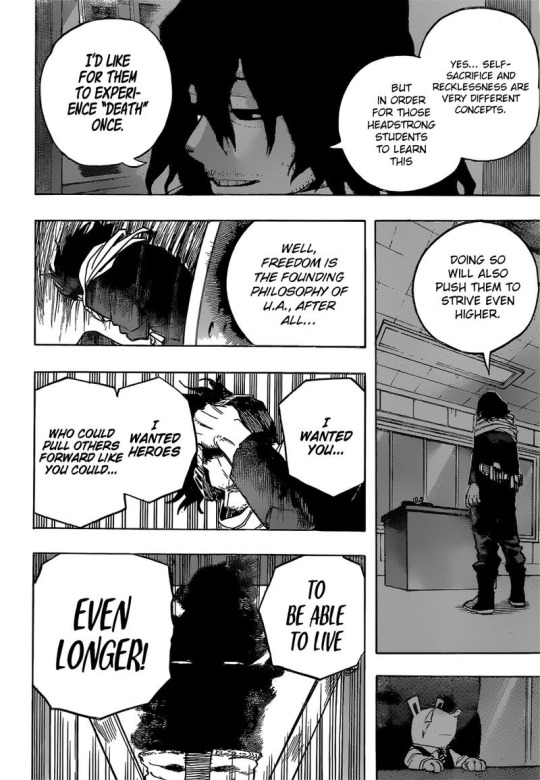
Sacrificing something is a type of death that occurs in stories; this should happen in a redemption arc, which is why I’ve been saying Enji needs to sacrifice his hero reputation to help save Touya and even then it’ll still be Shouto imo who does the saving. But physical death?

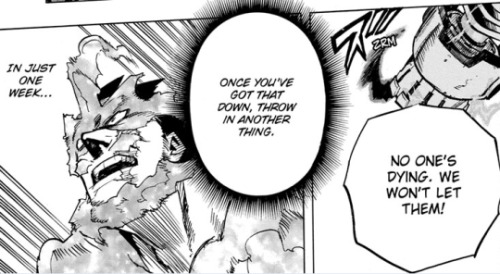
If you want further analysis of the latter two panels and how they relate to the ending, see here.
We already have another villain who will definitely die redemptively (Kurogiri--an adult coded character--because he’s already, like, dead), and Spinner and Mr. Compress aren’t coded as kids so I hold them with anxiety towards the end. But again, this isn’t me being ageist or saying this is the way things ought to be in fiction or real life: it’s me looking at writing tropes and saying that child-coded characters tend to survive their redemptions. See: Zuko. Why? Because the death of children or child-coded characters is a tragedy. When a child-coded character dies redemptively it doesn’t feel like a happy ending and if framed as such, it’s often criticized for bad writing (see: Ben Solo). Curious even called this out in her fight with Himiko. I would hope Horikoshi doesn’t end the story being like yeah Curious was right that’s the best use of Himiko’s/Dabi’s/Shigaraki’s arcs:
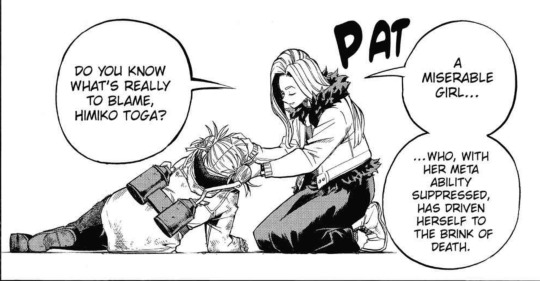

Additionally, as for the believability of a character getting a new chance after so much destruction and murder... well, it’s kinda a thing in shonen and even in seinen? For better or for worse, it’s a thing. We have Vegeta in Dragon Ball Z and Kaneki Ken in Tokyo Ghoul (Kaneki, by the way, is absolutely an inspiration for Shigaraki). We can debate how well-written these redemptions are (I personally have been quite critical of Kaneki’s despite wanting it to happen narratively), but it can be done. BNHA’s Japan especially isn’t as harsh a world as Tokyo Ghoul’s Japan, so it would make even more sense for something like Kaneki’s ending.
The reality is that the cycle of revenge via hurting people and then leaving hurting families and loved ones has to stop somewhere. Someone has to be the bigger person and step up and be like “naw.” That’s heroic. That’s brave. That’s sacrificial itself. Justice itself doesn’t really exist in its purest form without mercy.
There’s another genre-reason I don’t see death or jail as likely (I could see, like, maybe a mental health ward like Rei’s? But it’s too soon to speculate).
If saving is considered a good thing for the story, if it’s truly the highest ideal, then saving someone should be rewarded by the narrative. The characters who save should have a positive result to show us this a good thing.
This is why it doesn’t work for the heroes’ end journey to be accepting that some people cannot be saved. The notion of just accepting that you cannot do something, you cannot save everyone, you cannot, cannot, cannot, is called out as a flaw of society. Determination, on the other hand, is rewarded.
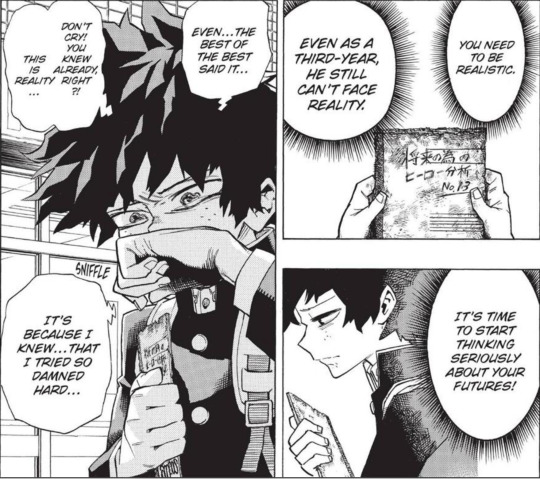
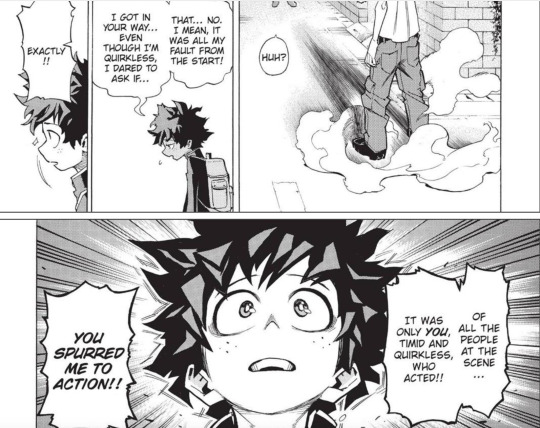
We see it with Deku as well as with Mirio.
So, what if they save them and the redeemed characters then go on to sacrifice themselves in their redemption and die (come to the same end)? If saving changes absolutely nothing for the saved person, if it’s too late for the saved from themselves to change and/or do anything that matters besides die, then the narrative theme of saving as important is left unemphasized at best and undermined at worst. Simple intrinsic knowledge that the kids “did the right thing” doesn’t cut it for a story with so much focus on physical saving when the kids are already doing the right thing; moral struggles about whether to choose to be good aren’t really Deku, Ochaco, or Shouto’s arcs. It works for Aizawa’s arc with Kurogiri, but not for the kiddos. If BNHA was more of a philosophical/spiritual text, that would indeed make sense, but it is not. Genre-wise, BNHA is a fantastical superhero optimistic story, not a gritty real-world set drama.
#bnha meta#mha meta#bnha 295#mha 295#deku#league of villains#shigaraki tomura#shimura tenko#todoroki shouto#todoroki touya#todoroki enji#endeavor#todoroki family#toga himiko#all for one#afo#uraraka ochako#bakugou katsuki#aizawa shouta#bnha theory#mha theory#my hero academia#boku no hero academia#midoriya izuku#kurogiri
630 notes
·
View notes
Text
For those of us who remember well how the mainstream media enthusiasm for war helped fuel not just this ill-advised war in Afghanistan twenty years ago, but the even bigger debacle in Iraq, the current media narrative is both bewildering and exhausting.
To be clear, there are some errors Biden made in withdrawing. Critics focused on the Afghans trying to flee the country without help from Americans are 100% right, and every effort should be made to get refugees to safety. Still, this larger media outrage over the withdrawal is a dark reminder of the pro-war bias in the press that helped create this mess in the first place: luring the American public into thinking a war in Afghanistan could ever end in any other way.
[…]
Biden spent eight years watching military leaders mislead President Barack Obama into believing that there was a way to win this war. Indeed, as blogger-turned-journalist-turned-blogger-again Matthew Yglesias — who also learned the hard way the dangers of buying into the media's imperialist war hype during the Iraq War — pointed out on Twitter, military leaders "were still hoping that turning the Trump/Biden withdrawal policy into an embarrassing shitshow would successfully bully the White House into reversing course the way they squeezed Obama in 2009 and Trump in 2017." He also suggested it would have worked if Biden hadn't spent 8 years witnessing that bamboozling in action.
[…]
The generous view of this pro-war bias on the media's part is that journalists give undue credence to the opinions of military brass and foreign policy hawks. It's tempting for a lot of journalists to treat these leaders as objective experts, rather than as people whose own egos have led them to embrace forever war to avoid admitting defeat. Certainly, it seems that the "defer to the experts" mentality is why Obama, who went into office with an anti-war message, was so easy to cow on these matters. But even the Washington Post's own reporting shows how much of a lost cause the Afghanistan war has been for years, and probably always was, making this "Biden screwed up" narrative even more inexcusable.
The less generous interpretation is that the mainstream media is thick with dudes (and a few women) who have read one too many doorstopper histories of WWII and are still wrapped up in fantasies of American military triumph. Either way, the result is what we saw over the weekend: A press that appears to have learned nothing about the dangers of reflexively backing a hawkish foreign policy and military establishment, despite debacles dating back to the Vietnam War.
"Perhaps the only thing Trump has in common with the current president is that Biden's also been an Afghanistan skeptic for years and was known as a voice pushing for ending American involvement within the Obama administration," Heather "Digby" Parton wrote back in April. Donald Trump had "no understanding of the complexities and only saw it as a way to burnish his reputation as a 'winner' and a 'deal maker,'" she added, and yet even he still understood that there is no value in a forever war.
This is why it's good to be skeptical of the kneejerk assumption in the mainstream media that Biden will pay politically for "losing" the unwinnable war. Polling data on American attitudes about Afghanistan has long shown a mess. Most Americans don't know or care enough about the issue to have informed opinions. But this tacit agreement between Trump and Biden that it's time to get out — again, probably the only thing they agree about — points to the fact that this endless conflict in Afghanistan doesn't really fit into what ordinary Americans, right or left, believe the American military is for. Liberals tend to reject American imperialism outright and see the military only in defensive terms. As for conservatives, well, Trump's tendency to talk about "keeping the oil" from Middle Eastern countries was, as usual for him, gross and illegal. But it was also an insight into how ordinary conservatives see American imperialism, as something only worth engaging in as a pillaging exercise. This whole pretense that we're going to set up other nations as democracies at the end of a gun no longer holds interest among ordinary Republican voters.
[…]
It's doubtful, however, that most Americans will ultimately remember this differently than they do the end of the Vietnam War or the withdrawal from Iraq — as a sad but inevitable end to yet another misguided American adventure war. Biden won't be seen as a failure, so much as the guy who just accepted a reality that multiple presidents refused to embrace.
Unfortunately, the media response to the withdrawal of U.S. troops from Afghanistan after 20 years doesn't leave one with much hope that the mainstream press will be wiser the next time the hawks start beating the war drums, trying to lure the U.S. into yet another expensive entanglement bound for failure.
#just pasted like half the article#but it’s a good read on the background of American journalism and the Afghanistan war#also like you can’t talk about Afghanistan in 2021 without talking about Iraq in 2003#politics#us politics#media#journalism
59 notes
·
View notes
Text
Hey guys, do you know how easy it is to interpret Tommy’s character in an angsty way? Just to be clear, this is from Tommy’s perspective.
I think presently in the story Tommy’s character tries to act like he’s alright, but underneath his tough exterior, he’s developed a crippling lack of self-worth. We saw how his character became suicidal during the exile arc and he’s not fully recovered. He hides his issues better now, but they’re still there.
Tommy’s character has always been the sort who demands attention. He wants to be acknowledged, to be respected, to be wanted. And he’s always been very clingy about his closest friend, Tubbo. Tommy’s always been fighting for approval (while watching those around him receive it so easily.) Tommy gives love and affection quite easily - that’s why he always gets so strongly attached to everything - but he has a hard time receiving it.
Back around the L’Manburg war, he had a thirst to prove himself which Wilbur recognised it, pushing him to be better and fulfil his potential. At first, he told Tommy to work harder, that the others were contributing more and he wasn’t sure if Tommy was really cut out for revolution. Tommy took this as a challenge and took Wilbur’s ideals to heart. And Tommy did indeed prove himself - though initially he failed by fighting as he lost the duel, he gave up something he loved - his music discs - and saved the day and made Wilbur proud of him. And Wilbur’s approval meant the world to him!
So Tommy was happy as Wilbur’s right hand man, doing his best to be a good Vice President for him; he was feeling a sense of belonging as a citizen of L’Manburg. It was a nation he’d helped build, and that he’d given up a lot for. So he tried to be like Wilbur and be a good responsible second-in-command.
But then things went wrong. He and Wilbur got banished together. They’d failed L’Manburg.
Still Tommy was by Wilbur���s side. They could fix things. But... it wasn’t working. Tommy was still just himself and still had good intentions... however, no longer was Wilbur so proud of him: “You’re proving yourself to be too much of a loose cannon. There is a reason why you are not the president and never will be!”
Tommy was extremely hurt by this. Here’s some of his rambling about it. His tone is light but the words are not. “That was uncalled for. I thought I was getting all tough and then he dropped that bomb on me and I go ‘oh I’m just nothing, I’m just nothing. I’ll just, I’ll just continue. He’s right, he’s right. I’m not good enough, I’m just not good enough. Maybe I’m not that tough.”
Tommy doesn’t let that get him down for long though and becomes more attentive, trying to do better for Wilbur and support him even as he spirals. They still cared about each other and Tommy tries to be there and wants Wilbur to trust in him even if they disagree. Things are nearly okay as he struggles to get through to WIlbur.
Then Wilbur and Technoblade betray him and blow up L’Manburg, and Wilbur dies. Tommy doesn’t even really know how to process any of this. He’s quick to move on and tries to rally the others and affirm Tubbo’s presidency and that all was not so lost. If they had each other then they still had L’Manburg. He’d failed and lost Wilbur but he was not alone.
So, Tommy no longer had Wilbur - the person who inspired him, tried to make him be the best version of himself. He goes back to being himself. He still cared about others, he hadn’t forgotten L’Manburg but he wanted to take a step back and just be himself, focusing on his own personal goals. He’s already given a lot and lost a lot.
And here’s where Tommy’s self-worth issues really begin as his actions in robbing George’s house are met with serious punishment. It’s unfair - he’s being held to a different standard and he is aware that Dream is trying to provoke him- but it still hurts.
Tommy - he’d helped build L’Manburg, fought for it more than once, given up his discs for it and had been secure in the knowledge that he belonged there, he had his friends’ respect for all he’d done. But he was wrong. In one single incident, he’s called ‘the biggest liability they had,’ he’s seen as a problem they have to deal with.
He doesn’t want to be a problem, he hadn’t intended to cause that level of harm. Nothing he’d done warranted that manner of response from Dream - but of course Dream wasn’t looking to play fair, he wanted Tommy to suffer. It seemed like everyone was buying into the narrative - that they ought to appease Dream even if it meant giving up Tommy.
Tommy of course wanted to fight because this was wrong and unjust but everyone seemed happy to let Tommy be punished. He was the problem for getting angry and making things more difficult for them. Tommy hated this - he absolutely didn’t want L’Manburg to suffer for his actions - he’d even tried to explain how he had wanted to distance himself from L’Manburg thinking it was fine now that Tubbo was in charge.
And of course, it wasn’t just the nation - it was his best friend. Tubbo calling him a liability, Tubbo considering exiling him. Tubbo, whom he’d trusted above all others. What good was he if even his best friend found him too much trouble? Did they care about him?
The reason he was getting exiled was because he was supposedly the one who caused all the conflict and wars. That without him around, the server could finally have peace. Tommy’s selfishness was the problem. Tommy, who after all the conflict and trouble really did want to have a more peaceful life - once he’d been hungrier for war, but he’d changed and now really wanted peace. His greatest desire was to live in his home with his best friend and listen to music discs while watching the sunset. But that was too much, that was too selfish.
So when Tommy got exiled, the loneliness hit him hard. Did anyone really care about him? Did they like him for who he was? Did they want to spend time with him, give him the affection he so desperately craved? In exile, Tommy was entirely reliant on others coming to him rather than being able to go and talk to them. All the things he did during his exile were about getting others to come and visit him - he made bridges through the nether, made his island prettier, arranged a party, built a guest tent - anything to get people to come over - and stay.
But Dream slowly convinces him that no one cares but him. He tells him how L’Manburg looks nicer now that Tommy’s in exile, how it doesn’t take that long to travel over, that everyone decided not to come to Tommy’s party. And Tommy also becomes more cynical, concluding that they pity him enough to visit but they don’t truly care. After his failed party, he remarks that no one cares about him because he has no power anymore, suggesting that people only ever cared when he was part of L’Manburg and had a position - and without it, he’s nothing.
And Tommy’s so desperate for any positive attention that he ends up clinging to Dream, even though he is still vaguely aware that Dream’s his enemy and was responsible for many of his problems. Tommy just doesn’t care, as long as Dream is there for him. He wants to believe its real, even though deep down he’s always known it’s false.
He runs away from Logsteadshire, holding onto the knowledge that Dream didn’t really care and had just been trying to control. But the damage is still there. Tommy tries to be himself again, tries to act normal and ignore his problems. He quickly grows attached to Technoblade for being there and even supporting him against Dream. Technoblade was kind to him, even as Tommy was increasingly aware that he wasn’t really useful to him, Techno cared but didn’t really respect him for being just himself. And Tommy tried to be better again, this time being more aggressive, being more destructive as he helped terrorise L’Manburg.
And then Tommy realised he didn’t even respect himself anymore. “I’m worse than everyone I didn’t want to be!” “I know what I’ve done and I hate me for it.” For so long, Tommy had been clinging to the fact that he was still a good person deserving of the love and affection he so desperately craved. The trouble was in convincing anyone to pay attention to him. But when he found himself fighting Tubbo, he realised that he was wrong, maybe he’d been the one at fault all along and he’d been just blaming everyone else, like the selfish person he was.
So he tried to change, this time he was changing for himself, accepting himself as the one at fault in all his relationships. He apologised and got his priorities in order. And felt better about it, resisting Techno when he asked for his axe back, insisting that yes he was worthy. In admitting fault he’s able to repair his relationship with Tubbo, and for a brief time he’s able to feel like he belongs once more.
But no good deed goes unpunished. No sooner does he give up a disc for Tubbo than Dream says everything he’d done was for the disc and now he was going to destroy L’Manburg - the thing they’d been wanting to preserve. And he’s ruined his relationship with Techno, who agrees to help Dream destroy it.
Tommy gives everything for L’Manburg. And almost no one shows up to help fight. Dream practically says he does this all to hurt Tommy, because its fun. He destroys the things Tommy cares about purely because Tommy cares about them.
Then Dream almost kills Tubbo in order to hurt Tommy. Dream tells him his masterplan is to use Tommy’s love of things, the way he gets attached to things and causes others to get attached to control everyone. The way he desperately clings to people and things is being used against not just him but potentially everyone. Punished once more for caring. And Tubbo’s the one to suffer.
(Tubbo doesn’t blame him though. Tubbo cares. “What am I without you?” “Yourself.”)
All hope is not lost though - the rest of the server do come for him, they come to save him and maybe they do care? Dream was the problem - Dream’s the one who ensured no one came to his party, Dream’s the reason for everything - not him. When it really, truly mattered, the others came for him and Tubbo and locked Dream away.
It’s a good end. Though Tommy’s still struggling. He is not fully recovered from everything and his sense of self-worth is still very low. Everything he does now is in the pursuit of getting people to like and accept him for who he is. Tommy avoids joining Snowchester as he doesn’t want another L’Manburg. He just wants to stay neutral and spend his days talking to people, messing with them and having fun. He wants to care and trust people again and have them like and accept in return.
His hotel, he asked Sam to build it for him so it would look good but he does indeed care about it and has put in plenty of time and effort into making it happen. He wants people such as Philza to see it and be proud of him. He wants everyone to feel welcome - why he even sent out an invite to Dream his worst enemy which is... very worrying but definitely shows how much he wants it to be a friendly place for everyone regardless of their allegiances.
And he seems open to the idea of reconciling. Techno and Philza destroyed L’Manburg but he sent them an invitation anyway and seems like, regardless of what went on in the past, and he doesn’t really regret choosing L’Manburg but does feel guilty for leaving Techno, he doesn’t want to stay bitter enemies with anyone. He wants to fix things.
And finally, he couldn’t bring himself to destroy the egg. He couldn’t bring himself to destroy something that other people loved. He couldn’t allow himself to start another war - as he blames himself for every war he’s been a part of. Tommy’s been the victim of people destroying the things he loved for too long and has grown to hate war. His hotel is meant to be a safe place. And he is still desperate for love and attention. If that means taking a piece of the egg so those who like the egg might come to see him, then he’ll do that.
#long post#tommyinnit#meta#analysis#dream smp#it wasn't meant to be so long....#xD#exile arc#uh didn't really say it but tommy shouldn't need to change for others to the extent he has#he's allowed to just be himself#why does he fill me with such pain?#oh and i didn't even mention how niki and jack hate him#uh yeah thats gonna end badly when tommy realises#and if him sparing the egg leads to disaster#tommy's going to be wrecked#he only wanted a peaceful life#and to be accepted
111 notes
·
View notes
Text
The Rebel/叛逆者: A Review of Sorts
After being only semi-invested in the Rebel, I ended up getting so into it in the final weeks of its release, I’ve shelled out on IQIYI premium just to get the final couple of episodes a few days earlier.
That’s right kids, it’s a Review of Sorts. Unfortunately, I could not find a translation of the novella the drama is based on, so will be looking at it as a separate entity.
Most of this post is spoiler-free, however I have dedicated a few paragraphs at the end of it to discussing the final episode, as there are a few specific things about it I wanted to mention. There is a clear spoiler warning before that part.
If you don’t want to risk it, TL;DR version of this review goes something like this: Rebel is very decent, and positively one of the best things that I have seen to come out of China since I’ve jumped into that particular rabbit hole. It’s pretty well written, it’s very beautifully dressed and shot, and the cast is killing it. I thought it dropped the ball a little in post production, and I did not always love the pacing. Other than that, it’s incredibly decent, and well worth watching, unless communist propaganda really irks you, in which case stay very well away.
I have been having many conversations with @supernovasimplicity all the way through watching this drama, so there are likely to be some thoughts here that are influenced by those.
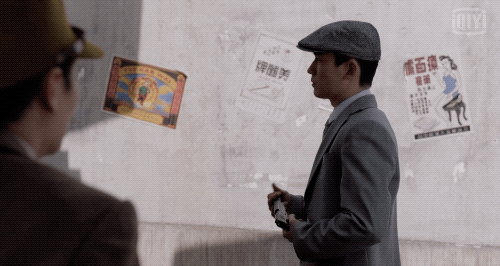
The story centers around Lin Nansheng, a struggling servicemen in the Guomingdang party. He has a great analytical mind, and absolutely no emotional capacity for his job. He has trouble handling violence, he is impulsive, he cannot speak to his superiors without bursting into tears, and has nothing even remotely resembling a poker face. And that is what makes this drama as enjoyable as it is.
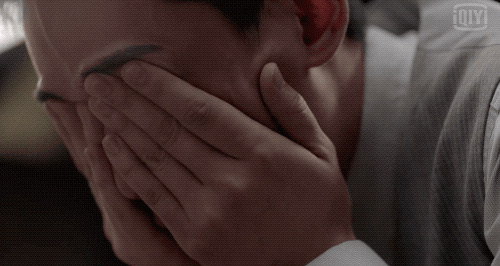
I don’t think Lin Nansheng’s journey would have been nearly as exciting had he started it from a place of competence. He botches up everything he touches because his big brain switches off the moment his emotions kick in. And so, when you see him grow in confidence, learn to control himself, learn to fake his smiles and compliments, you can’t help but feel a strange sense of pride. It also makes Lin Nansheng very likeable as a character for reasons other than Zhu Yilong’s ability to look like a bush baby.
It did take me a while to feel fully engaged with his performance - not because there is anything lacking in it, but just because it’s hard to be truly surprised by his choices after the exposure I have given myself to his work. That said, at about a half-way point I got charmed by him anyway, and there were quite a few scenes that were truly mesmerising. There were scenes where he broke out of the familiar mould of big unguarded eyes and fluttering wet eyelashes, and tried something that was not pretty: every time to a great success. I am hoping to see more of that in his future work.
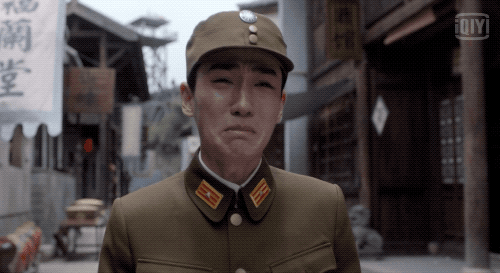
I really wanted to like the female lead, Zhu Yizhen, but unfortunately both the way she was written and the way she was performed by Tong Yao left me somewhat cold. It did not help of course that the screenplay ended up sidelining her at every turn, leaving her with very little personal agency. She was set up so interestingly, but in the end her sole purpose became being someone for Lin Nansheng to pine over. It is particularly curious from a perspective of meta storytelling: seeing how this is all centered around superiority of communism, which as a whole was, arguably, ahead of its time in the matters of binary gender equality.
The ensemble cast of the drama is stunning. Wang Yang came very close to stealing the show at several points as Chen Moqun, somehow managing to make his rather unlikeable character interesting. I can say the same thing about Zhu Zhu who absolutely shined as Lin Xinjie, showing an incredible range and imagination in her performance.
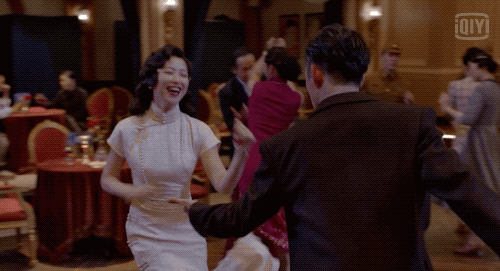
The overarching story of the show is engaging, with some incredibly suspenseful elements; every narrative arc including a nice progression through it. As spy thrillers go, it was fairly well plotted. You could if you go looking for a few things that did not pay off in a satisfying way (notably, the Chekhov’s cyanide capsule), but you overall the story really was well told for the most of it.
I did, however, feel like the pacing started to fall apart in the last quarter of the drama. Last episode in particular really did feel rushed, not just due to its pace, but also in a way it failed to pay off the final mission in any visible way. There will be more on that in the spoiler section of this post.
Important to note that The Rebel is a show made in Communist China in the year 2021. It does not ideologically side-step from the path that was laid out for it by that fact. Which is to say, it is, undeniably, filled with propaganda. Communists are the good guys, and if you think a good guy (or gal) is not a communist, they probably secretly are. With one exception of a friendly character who is not a communist, and whose fate we actually never find out. Curious, that.
The Rebel is not a kind of a show where censorship-appeasing scenes are shoehorned in. It’s a kind of a show in which the main theme is Sacrifice For the Party.
Aside from the being the moral vector of the show, Mao’s gentle teachings explicitly help get Ling Nansheng out of prolonged depression following his injury, and almost annoyingly, this sat incredibly well with the character, as he was written. Lin Nansheng is conceived as this naive idealist who wants to be on the front line, who needs validation and support of others. His - and I can’t believe I’m saying this - his being disillusioned in his beliefs and choosing to join a party which includes people whom he likes and trusts makes sense. Him finding this one thing that gives him hope and letting it propel him into gaining confidence and competence makes sense.
In many ways, the Rebel is a story of Lin Nansheng’s failure to become an antagonist within the world of the drama.
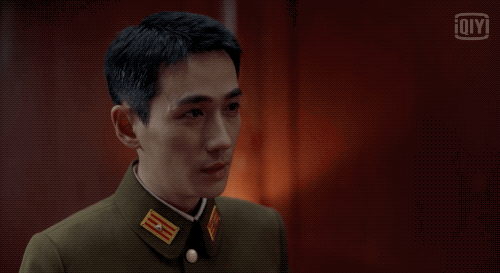
I have honestly spent this past couple of weeks pondering whether being well written makes political propaganda better or worse, whether the subtlety of it makes it more or less palatable, whether it’s enough, as a viewer, to be aware of it to shrug it off. Ultimately, this is not something I could or should make moral judgements on, but I do believe that it’s possible to acknowledge the fact that propaganda exists in the drama, and still appreciate it for a good piece of television that it is.
That said, I am very well aware that me being kind of okay with it stems entirely from my own removal from the culture this is made in, and I am, perhaps, lucky to even have a choice as to whether I want to engage with a product which is, undoubtably, here to dress political ideology in fancy clothes.
I have, on the other hand, also seen many things in Russian media of the “Annexation of Crimea is Good Actually” variety and those make me feel very unwell, so feeling somewhat at ease with blatant political propaganda in Chinese media makes me the biggest hypocrite.
But, I digress.
Before we go into some specific plot-related things, I would like to mention that the Rebel has this weird dichotomy in which the production is sublime, and the post-production… not so much. The show very well shot. Every element of it sits perfectly together, not a single prop out of place, not a single extra underdressed, not a page of script not put to good use. It’s lit to perfection. It’s scored beautifully. So much of this show is just stunning.
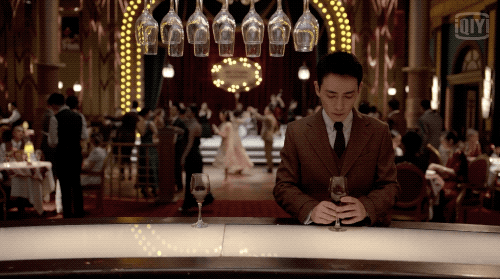
And then… there is post-production.
This is not even about bad CGI (and the CGI is, indeed, bad), it’s just that most of post-production as a whole feels rushed.
Starting with surprisingly imperfect editing, which at times just fails to make the scene flow together. The final line of dialogue would be spoken within a scene, and it would fade to black instantly without a single breath to indicate a full stop. A montage sequence would be created, but every shot within it condensed to a second, making it feel incredibly fast-paced when the effect should be the opposite. There would be a cut away from a speaking character and to the same speaking character from a slightly different angle, making it dynamic without any reason to do so. There are a couple of truly startling jump-cuts.
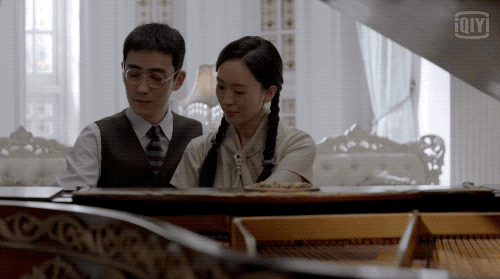
I did not speed this gif up. This is part of a romantic montage, edited like it’s a goddamn action sequence.
And of course dear old friend slowing down footage shot at 24FPS. Please don’t do this. You think no one notices - but we do.
There are other tell-tale signs of production rushing to the finish line: occasional, but very noticeable ADR glitches, very sloppy job done at sound mixing, which contribute to parts of the show feeling ever so slightly off.
It’s not unforgivable, but it does make me wish the same amount of care and efforts that went into shooting this drama would also go into it after it was all in the can.
Oh, and just because if you know me you know I have a professional fixation on fights, and I am happy to say most action scenes are toe-curlingly delightful. Hot damn those fights are good. I am absolutely in love with the shot below, for example. Placing an actor behind a piece of set so he can exchange places with the stunt double during a one shot is such an old trick, but the execution, timing and camerawork are just... flawless. This is what perfection looks like.
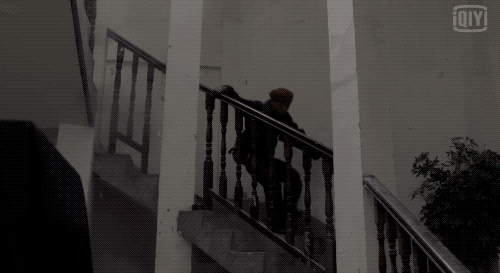
Now we got all that out of the way...
SPOILERS FOR THE SERIES FINALE BELOW
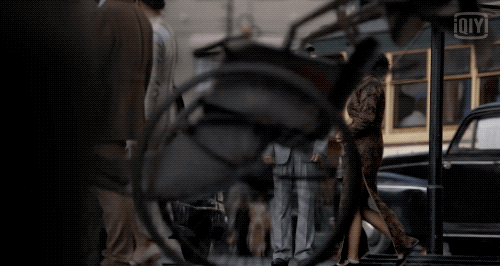
Here’s the thing. I wanted to love the ending and I found that I could not.
The final mission was presented as important, and honestly the scene in which Zhu Yizhen is sending the vital message out as Lin Nansheng holds his ground in hand to hand fight is incredibly dynamic. Party, this is due to the fight itself being incredibly well choreographed, yes, but it’s also where it sits within the narrative, how high the stakes are for everything surrounding it.
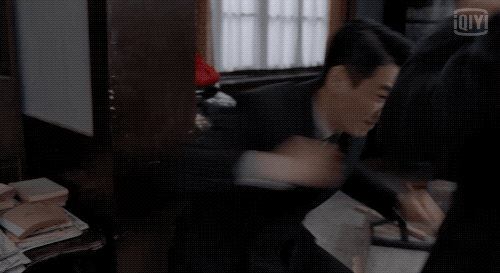
But then, the tension all but bleeds out. The Important Message is sent, the fight is won, and we are treated to ten minutes of a very slow car chase, problem of which is not even its speed as much as its placing within the story. As in, by this point both of those operatives have lost their cover, and completed their Very Important Mission. It would be very sad if they died, but their survival does not technically contribute to their cause. Moreover, Zhu Yizhen getting mortally injured in order to protect Lin Nansheng as part of her mission read a little empty when the mission is technically over.
While I personally found Lin Nansheng slow recuperation and his low key ending enjoyable, I think I would have preferred to have seen a more tangible pay-off to all the sacrifices made in the name of “bright communist future”, just a little more justification for every moment of death and despair we witnessed. I would have certainly at the very least preferred to see Wang Shi’an’s death on screen. Considering how many likeable characters martyred themselves on screen, denying us the death of the one antagonist just seemed cruel.
I really did love the ambiguity of the final few scenes however, if we consider the children choir at the end a fantasy. The idea that Lin Nansheng will live out his life in this hope that Zhu Yizhen is still alive, imagining her just outside of his field of vision, his only joy being in this fantasy of her… now, that is incredibly strong. I equally like the idea of rest being promised to him at the end of his journey, and said rest being painful, and slow and unwelcome.
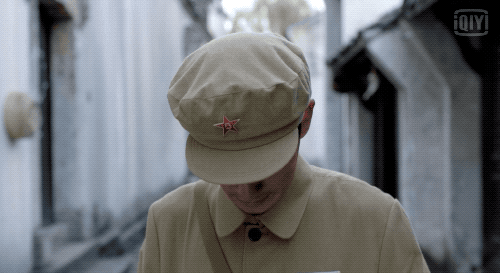
But it felt like as they chose not to to lean into the “sweet” part of the bitter-sweet tone of the ending and we’re unable not commit to the “bitter” part either, so it lands with a splat which is somewhat lacklustre.
---
This concludes my thoughts on the Rebel.
I am more or less out of Zhu Yilong’s filmography to watch, which is probably a good thing at this point. I have just emerged out of several back to back work projects - literally today - and will hopefully once more have time for things I grew to enjoy doing during the lockdown.
Those things, if you have not guessed, include watching Chinese television and writing things about Chinese television.
45 notes
·
View notes
Note
I know you've gotten anons about the YMBQ prophecy recently but I was wondering in what context could it be obvious for the reader that Daenerys is the YMBQ if Cersei is most likely to die or leave KL once Aegon arrives and not Daenerys. Even if Daenerys takes KL later on wouldn't he technically be the one to take all she holds dear (her power as regent)?
First of all, Anon, I think it’s interesting that you say that Young Griff (rather than Arianne) would take all that Cersei holds dear in this hypothetical scenario (that most people assume will come to pass). asoiaf tumblr fandom loved (loves?) to take for granted that Arianne would be YMBQ (after all, it was/is taken for granted that she would marry Young Griff and become his queen consort) years ago. At the same time, though, I’m not sure if you’re implying that Young Griff might actually be the one to fulfill the YMB(Q) prophecy in this ask. I actually saw this theory before. So I’m going to make counterarguments to this theory first and then address your question about how and when Dany might be revealed as the YMBQ (and if that’s what you were specifically looking for, just skip to the end, though you might be disappointed by the fact that I'm not really providing definitive answers because I have a lot of doubts myself).
In a way, it makes more sense for Young Griff to fulfill the prophecy rather than Arianne. Let’s remember what Cersei wants the most, which is shown in the beginning of her very first chapter:
She dreamt she sat the Iron Throne, high above them all. (AFFC Cersei I)
Unfortunately for Cersei, she can’t ever actually sit the Iron Throne, which is pointed out several times:
Cersei shifted in her seat as he went on, wondering how long she must endure his hectoring. Behind her loomed the Iron Throne, its barbs and blades throwing twisted shadows across the floor. Only the king or his Hand could sit upon the throne itself. Cersei sat by its foot, in a seat of gilded wood piled with crimson cushions. (AFFC Cersei V)
~
Seated on her gold-and-crimson high seat beneath the Iron Throne, Cersei could feel a growing tightness in her neck. (AFFC Cersei VII)
~
Cersei sat beneath the Iron Throne, clad in green silk and golden lace. (AFFC Cersei X)
As the first quote states, only the king or the Hand can sit the Iron Throne, which is what Cersei wants the most, since, to her, it symbolizes almost unlimited power ("high above them all"). Indeed, I would argue that what Cersei holds dear is the chance to reign supreme (“The rule was hers; Cersei did not mean to give it up until Tommen came of age. [...] If Margaery Tyrell thinks to cheat me of my hour in the sun, she had bloody well think again.”), not “her power as regent” (as you put it), which is limited by nature. After all, the king’s wife and mother can’t sit the Iron Throne. This means three things to me:
Queen consorts like Margaery or Arianne (if she actually marries Young Griff, which is far from certain) can’t take all that Cersei holds dear.
Queens claiming power in their own right but who have no claim to the Iron Throne are excluded too. In other words, Asha or QitN!Sansa (another fan theory that’s far from certain and that’s accepted as future canon) can’t take all that Cersei holds dear.
Only a she-king (that is, a queen regnant) with a claim to the Iron Throne can take all that Cersei holds dear - that’s Dany.
But then, we have Young Griff. He is a king with a claim to the Iron Throne, so he could, in theory, take what Cersei holds dear and fulfill the prophecy. However, I find that very unlikely for a number of reasons:
GRRM doesn’t highlight men’s physical appearances or objectify them in the same way that he does with women, as a lot of people have already criticized him for. He makes a point of mentioning women’s accomplishments along with overpraise for their physical appearances (though one might be generous and chalk that up to social commentary about how their society objectifies women instead of giving them their due praise for what they do). He encourages his fans to speculate about who is the YMB(Q) and pit his female characters against each other based on their physical appearances (e.g., people have criticized how Sansa stans often mention the number of times the word “beautiful” appears in Sansa’s chapters to back up their belief that she’s the YMB(Q), but the way GRRM himself wrote the prophecy lends itself to this sort of analysis) because he uses certain tropes uncritically. He portrays fat women negatively in comparison to thin women (see: Cersei (who’s said to be gaining weight throughout AFFC as she becomes more unstable) vs Dany, Lysa vs Cat, Barba Bracken vs Melissa Blackwood, arguably Rhaenyra vs Alicent). He takes an almost voyeuristic pleasure in describing women’s bodies and women having sex with women (see how Dany and Irri’s or Cersei and Taena’s sexual encounters don’t give any depth to Dany’s, Irri’s and Taena’s characters and, as far as I can tell, are mostly written to fetishize them). Consider, for instance, how 13- to 16-year-old Dany is the most sexualized character of the book series, while I’m not even sure if her male counterpart Jon is supposed to be considered attractive or not (on the one hand, he’s attracted women like Ygritte and Val; on the other hand, he’s meant to look a lot like Ned, who’s regarded as plain in appearance, especially in comparison to the hot-blooded Brandon). All of this is to say that I doubt that a man will fulfill a prophecy that remarks upon the person’s physical appearance (“younger and more beautiful”). Considering GRRM’s writing problems, a woman is much more likely to do so.
Young Griff is supposed to represent a lesser version of Dany (note that I’m talking about Young Griff as a fictional character, not as a person). After all, unlike Dany, Young Griff didn’t get to have lived experience of poverty, he didn’t get to have his skills tested, he didn’t get to apply the lessons he learned along the way, he didn’t get to take action and make mistakes and gain valuable experience and wisdom, he didn’t get to choose to stay in Slaver’s Bay solely to help marginalized people who aren’t connected to him by neither blood nor lands (which would emphasize how he doesn’t view his birthright merely as something owed to him, but rather as a means to “protect the ones who can’t protect themselves”). He could have had this sort of character development if GRRM wanted him to, but he has a different role in the narrative: he’s a tertiary character who we’re not meant to know all that much as a person or about how he would fare as king because he serves as a foil to Dany. With all of that in mind, what would be the point of having this minor character, who was introduced in the fifth book of a seven-book series, fulfill this prophecy rather than the one protagonist who the author said was deliberately written as Cersei’s foil multiple times (more on that below)?
Which brings me to a point that @rainhadaenerys made in our upcoming Dany/Cersei meta... Cersei views women with contempt because she thinks that they can only attain political influence with “tears” and with what’s “between [their] legs” (as she tells Sansa). This informs why, for example, she projects the unfounded idea that a widow must have lovers on Margaery or why she herself uses money and sex to keep her men loyal (which ultimately backfires on her). Unfortunately, it’s true that “[Cersei’s] strength relies on her beauty, birth and riches”. Because of her internalized misogyny, Cersei can’t conceive of a woman who might rise to power primarily because of her intelligence and shrewdness… Except that there is a woman who successfully conquered three cities and ruled the third and freed thousands of slaves relying primarily on her actual wit, political savviness and leadership skills rather than on sex, birthright or money… Dany. Dany is the competent, selfless ruler who could overcome many of the patriarchal limitations that Cersei couldn’t (hence why Cersei is a tragic figure). If Young Griff were to be the YMB(Q), he would simply be one of the many men (along with Robert, her brother, her father and the other Hands) who Cersei thinks wronged her and prevented her from staying in power. If Daenerys were to be the YMBQ, she would challenge Cersei’s toxic beliefs about women, which prevented Cersei from even imagining that a she-king might be the one foreshadowed to defeat her or that a woman (that isn’t her, of course) could actually be able to earn her accomplishments (just like she can’t imagine that Jaime might actually betray and kill her). Now, someone might argue that GRRM is not “woke” enough to do this, but I would disagree in this particular case. There are valid critiques to be made about how he wrote his female characters (I’ve made some points myself on the first item), but it’s still true that Dany’s character arc was written with awareness of how her gender affects her experiences. If that hadn’t been the case, AGOT wouldn’t have initially set up several men (Viserys, Rhaego, Drogo) to be claimant to the Iron Throne/SWMTW/the protagonist only to reveal that these roles are actually meant to be fulfilled by Dany, a woman. If that hadn’t been the case, he wouldn’t have had Maester Aemon acknowledge that “no one had ever looked for a girl” when they pondered on who might be AA/PTWP. So I don’t put it past GRRM to make Dany the YMBQ as a way of challenging Cersei’s entire worldview.
Indeed, I actually think that’s likely to be what he’ll write. GRRM has stated multiple times that Dany and Cersei are meant to be compared and contrasted because they were consciously written by him (specially in AFFC/ADWD) as narrative foils:
George regrets that Cersei and Dany will not be contrasted directly. (x)
~
His biggest lament in splitting A Feast for Crows from A Dance with Dragons is the parallels he was drawing between Circe and Daenerys. (x)
~
Cersei and Daenerys are intended as parallel characters --each exploring a different approach to how a woman would rule in a male dominated, medieval-inspired fantasy world. (x)
~
While discussing how he writes his female characters, he also mentioned that splitting the books as he did this time meant we didn't get the parallel between how Danaerys and Cersei both approach the task of leadership, which is a bit of a shame. (x)
~
And that one of the things he regrets losing from the POV split is that he was doing point and counterpoint with the Dany and Cersei scenes--showing how each was ruling in their turn. (x)
I think Young Griff as the YMB(Q) is very, very unlikely. If it’s not Dany, then I think Brienne (who at least is a viewpoint character that we know intimately) as the YMBQ (though I doubt it because she can only take Jaime away from Cersei and, as we saw in AFFC, Cersei was willing to separate herself from Jaime once she realized that he would question and disagree with her decisions and, in her mind, threaten her influence and power, i.e., what she wants the most) or even Cersei herself (the basis of this theory is that a younger Cersei caused her own downfall by making the choices she made. It’s not impossible considering that Cersei’s unreliable viewpoint prevents her from ever taking responsibility for her actions. Still, I think it’s unlikely because she’s been positioned as a passive participant in these prophecies - someone/some people kills her children, some person takes away everything she holds dear, some person murders her. Just like there’s a valonqar to kill Cersei, I think there’ll be a YMBQ to defeat her) are more plausible candidates. However, as I said in previous answers, Dany and Cersei have lots of clearly intended parallels and anti parallels (hence why GRRM mentioned them at least five times publicly) that people don’t often appreciate (but that I don’t want to mention here because I’m saving them for edits and that long meta). I find it hard to believe that GRRM would lay all this groundwork to contrast these two queens only to reveal that a minor character is the actual YMB(Q).
Now, the question about “in what context could it be obvious for the reader that Daenerys is the YMBQ” is difficult because, IMO, I don’t feel like there’s enough information to give you a reliable answer. First, let’s recap the most common theories, which, while I don’t think should be accepted as canon just yet, are popular for logical reasons. Here’s what GRRM said about the future events in the initial outline and interviews:
While the lion of Lannister and the direwolf of Stark snarl and scrap, however, a second and greater threat takes shape across the narrow sea, where the Dothraki horselords mass their barbarian hordes for a great invasion of the Seven Kingdoms, led by the fierce and beautiful Daenerys Stormborn, the last of the Targaryen dragonlords. The Dothraki invasion will be the central story of my second volume, A Dance with Dragons. (x)
~
GRRM: Yes, three more volumes remain. The series could almost be considered as two linked trilogies, although I tend to think of it more as one long story. The next book, A Dance With Dragons, will focus on the return of Daenerys Targaryen to Westeros, and the conflicts that creates. After that comes The Winds of Winter. I have been calling the final volume A Time For Wolves, but I am not happy with that title and will probably change it if I can come up with one that I like better. (x)
~
He said that in his original plan (when he wanted to write a trilogy) the Red Wedding would take place in book one, and Dany’s landing in Westeros in book two. Now he says that Dany’s arrival in Westeros will take place in book 5, A Dance with Dragons. (x)
~
From there he started to plan a trilogy, since there were 3 main conflicts (Starks/Lannisters; Dany; and the Others) it felt it would neatly fit into a trilogy (ah!), but like Tolkien said, the tale grew in the telling. (x)
~
“Well, Tyrion and Dany will intersect, in a way, but for much of the book they’re still apart,” he says. “They both have quite large roles to play here. Tyrion has decided that he actually would like to live, for one thing, which he wasn’t entirely sure of during the last book, and he’s now working toward that end—if he can survive the battle that’s breaking out all around him. And Dany has embraced her heritage as a Targaryen and embraced the Targaryen words. So they’re both coming home.” (x)
GRRM’s words seem to indicate that Dany will go to Dragonstone ("they're both coming home") and then King’s Landing in her campaign to take back the Seven Kingdoms before she goes to the Wall to fight against the Others.
And it is quite possible that she will clash with Young Griff. For one:
Hi, short question. Will we find out more about the Dance of the Dragons in future books?
The first dance or the second?
The second will be the subject of a book. The first will be mentioned from time to time, I'm sure. (x)
For two:
"It is dragons."
"Dragons?" said her mother. "Teora, don't be mad."
"I'm not. They're coming."
"How could you possibly know that?" her sister asked, with a note of scorn in her voice. "One of your little dreams?"
Teora gave a tiny nod, chin trembling. "They were dancing. In my dream. And everywhere the dragons danced the people died." (TWOW Arianne I)
For three:
Glowing like sunset, a red sword was raised in the hand of a blue-eyed king who cast no shadow. A cloth dragon swayed on poles amidst a cheering crowd. From a smoking tower, a great stone beast took wing, breathing shadow fire ... mother of dragons, slayer of lies … (ACOK Daenerys IV)
Now, here are my observations/questions/doubts:
The “cloth dragon” receiving a round of cheers from the crowd seems to indicate that a) Tommen will indeed fall from power when Young Griff (who’s already in Westeros almost ready to attack) invades King’s Landing and that b) Young Griff will inspire love from the population.
The more obvious possibility is that the second dance of dragons refers to a Dany versus Young Griff confrontation, especially since she’s prophesied to slay the lie that he represents (that he’s not Rhaegar Targaryen's son, but actually Illyrio’s son and a Blackfyre). However, since Victarion is currently in Meereen with a dragonbinder, it’s very likely that Dany will lose control of one of her dragons to a Greyjoy (either Victarion or Euron Greyjoy himself) and then will arrive in Westeros with only two of her three dragons. Or maybe Euron will use one of the dragons to attack Young Griff and that will be the second dance (though I find that unlikely since, again, Dany is prophesied to slay Young Griff’s lie). Or the second dance could actually refer to Dany versus Euron.
There are alternative speculations to consider. Right now, the consensus in the Dany fandom seems to be that there’s already too much in Dany’s plate for her (uniting all the khalasars and being hailed as the SWMTW; going back to Meereen; meeting Tyrion, Jorah, Moqorro and other characters; maybe going to Yunkai; going to Volantis; etc) to go to King’s Landing, which led to people assuming that only Cersei and JonCon will be involved in the city’s burning. It’s even theorized that Dany might actually skip King’s Landing and go to the Wall instead. These theories make a lot of sense and aren’t implausible, but it’s hard to reconcile them with GRRM’s initial intention with Dany (though it’s also been argued that he may have given part of her initial role to Young Griff). Additionally, I don’t think timeline issues are necessarily a guarantee of what GRRM will do with Dany. He made Tyrion travel much faster than reasonable back in AGOT to have him meet Catelyn in the inn at the crossroads and to be taken captive by her. So I wouldn't put it past GRRM to do something similar with Dany by having her arrive earlier in King’s Landing than she reasonably would just because he wants it to happen. And, as much as I don’t want it to happen and even though I criticized the theory before, I don’t think it’s impossible (though it’s not guaranteed either) for Dany to be accidentally involved in the burning of King’s Landing (though there is a recent counter-theory to that as well).
Re: Cersei, a lot of people tend to assume that she’s going to die when Young Griff takes King’s Landing, but I am not really sure. I do think that her parallels with Aerys II will pay off and reflect her ending. But that doesn’t prevent Cersei from surviving Young Griff’s invasion and meeting Dany later. Cersei could escape to Casterly Rock and they could meet there. Or Cersei could later attempt to retake the capital again in another impractical plan of hers, which then leads to King’s Landing burning. I don’t know.
Does Dany have to meet everyone to fulfill these prophecies? I’m not sure. Does Dany necessarily need to meet Young Griff and Stannis to slay their lies? Does she necessarily need to meet Cersei so that the readership finds out that she’s the YMBQ? Will there even be an actual moment that makes it “obvious for the reader that Daenerys is the YMBQ”? I don’t know, Anon. It may end up being up for people’s interpretation. Dany might end up burning the Iron Throne, if the theory about her accidentally burning King’s Landing actually happens. Dany might willingly melt the Iron Throne and install a new form of government that gives the smallfolk more political influence. Both of these possibilities could symbolize the end of Cersei’s desire for absolute power, even if Cersei and Dany don’t actually meet. I’m not even sure that there will be a moment that outright reveals that Dany is AA/PTWP/SWMTW (even though, IMO, the foreshadowing is way too overwhelming for it not to be her).
Speculating about Dany being the YMBQ is fun for me because it requires delving into her characterization, her parallels with Cersei and canon material in general. On the other hand, speculating about how this would actually happen is, IMO, less interesting (though I still enjoy reading what other people have to say) because it’s hard to accurately predict future plot points with the current information that we have (and I resent how fandom already accepts so many theories as unpublished canon). Dany has too many places to be and too many things to do and it’s not certain that she’ll be in King’s Landing when it burns (though I tend to think she will for the aforementioned reasons), the second dance of dragons can refer to different confrontations, it’s not certain that Dany needs to meet Cersei (or Young Griff or Stannis) to fulfill all these prophecies and it’s not certain that Dany is going to be explicitly revealed as the person who fulfills all these prophecies. We still have two books worth of plot development, so I really don’t think it’s possible to predict how the actual events will unfold. Sorry about not being able to give more definitive answers... I actually ended up making more questions. But that's kind of the point for now.
50 notes
·
View notes
Text
Night in the Woods & Optimistic Nihilism, Pt. 1: Constellations
“So I believe in a universe that doesn’t care and people who do.”
Night in the Woods manages to create one of the most realistic narratives I’ve ever seen crafted in a video game. And that’s a bold statement, one that shouldn’t be tossed around lightly. Yet I feel entirely concrete in saying it. It’s quite the diverse game, dealing with a range of topics so wide that it’d be hard to cover all of them in one single post. I hope to cover more of them someday, but today I’ll be narrowing in on one specific point that resonated especially well with me personally: finding purpose in an existence that is inherently devoid of it.
And it’s here that I’m going to say that, to anyone who hasn’t played NITW yet, stop reading this right now and go pick it up. It’s only $20 and with it comes an experience that remains consistently enjoyable and impactful throughout its entire runtime. I won’t be holding back from relevant spoilers for the rest of this post, so now’s your only chance. Go away. But come back once you’ve played the game. That’d be pretty cool I think.
~~~~~~~~~~~MILD SPOILER TERRITORY BELOW~~~~~~~~~~~
Now that the uninitiated are gone, it’s finally time to wrap back around to that quote at the beginning of this post. A universe that doesn’t care, and people who do. It perfectly aligns with the definition of optimistic nihilism, a term seemingly dubbed by a youtube channel in 2017. For those who are unaware, optimistic nihilism is exactly what it says on the tin. It’s the philosophy that the universe is inherently uncaring, that there’s no concrete meaning to life that we can grasp onto, yet we as human beings are uniquely capable of creating our own meaning without requiring some higher power or order to do it for us. We can choose to pursue what we wish for out of our lives, free to choose our own individualized path through the blank slate that is existence and draw whatever patterns we may choose from it.
As you read through that brief summary you may have already begun to understand exactly why I consider Night in the Woods to align particularly well with optimistic nihilism. The game is not exactly lacking in the theme of finding meaning within things that may be meaningless in the most literal sense. It’s been there since the very beginning, with NITW’s first supplemental game Longest Night. It’s a simple little game featuring Mae, Bea, Gregg and Angus identifying various constellations and making characteristically entertaining quips about each of them. Despite the game’s relative simplicity it acts as an early (over 3 years before NITW itself released!) establishment of NITW’s ever-present theme of establishing meaning in things that don’t have meaning by themselves by using one simple thing: constellations.
Constellations are a perfect medium to establish the philosophy of optimistic nihilism and it is evident that Infinite Fall were acutely aware of that from a very early point in the development of NITW. All constellations really are just patterns of stars we may see in the sky at night that people have assigned their own patterns and meanings to. Most stars sit so far away from the Earth that the human brain struggles to even comprehend how far away they truly are beyond a simple “Wow! That’s pretty far!” They’re balls of gas, unable to care about or even recognize whatever we humans see within them. Most of them have existed for longer than we have and will continue to persist long after we die. Yet the human race has taken it upon themselves to assign patterns to them and continue recognizing said patterns long after we’ve obtained knowledge about what the stars that form them truly are. In nature they hold no inherent meaning and have no rhyme nor reason to their locations relative to each other from our perspective, yet we have used our minds to instill meaning into them and draw patterns that can only be drawn from where we stand. The universe did not care about how it put them there nor how any living being may interpret them, but people cared enough to give them meaning.
Years after the release of Longest Night, Night in the Woods proper came out. And in it the usage of stars was far from ditched. Their function as being one of the elements perpetuating NITW’s optimistic nihilism was only expanded. Every two days in the game you are offered the opportunity to choose to hunt for dusk stars with a character named Mr. Chazokov. The interactions with him themselves don’t offer much in the ways of adding upon the pre-established theme of finding meaning within none, though their mere inclusion does help cement the theme as an important part of the game. The true point in which the theme is finally brought front and center is when the player can choose to go ghost hunting with Angus at Possum Jump. After some uneventful ghost hunting, Mae and Angus decide to rest at the top of a hill and do some stargazing. At this point the game essentially retraces (literally and figuratively) all the ground covered in Longest Night. Mae connects constellations together and Angus names them and gives a brief explanation for each of them. It’s a charming little moment that eventually evolves into Angus explaining the abuse he endured throughout his childhood to Mae. But what’s relevant to this specific analysis is Angus’s attitude throughout. He continually stays true to and loops back upon the fact that, while the stars themselves are very real and the stories given to them do very much exist, the stars really don’t mean anything by themselves. It all culminates with Angus explaining his tragic childhood to Mae. But what’s important to the overall narrative of this essay is Angus’s response when Mae asks him if he believes in anything.
It’s at this point that the game gives its most obvious addressal to its philosophy of optimistic nihilism. It’s like the pot finally boils over and it says “alright, time to finally talk about this.” As a response to being prompted about his beliefs, Angus explains his thoughts by using the constellations recently outlined as a convenient example. It’s here that the quote that spurred this whole essay on shows its head. “So I believe in a universe that doesn’t care and people who do,” is the final quote summarizing Angus’s philosophy on meaning in the universe. And if that isn’t the clearest possible representation of optimistic nihilism in NITW then I don’t know what is. It’s a simple little quote, yet it manages to single handedly encapsulate what optimistic nihilism is. Of course, it’s framed as the view of one character in the game, and a character thinking something doesn’t immediately mean that the entire work subscribes to that philosophy, but as you think about NITW and its various elements more and more it becomes increasingly apparent that it is indeed representative of the philosophy of optimistic nihilism.
And with that vague statement I’ll be leaving off the first part of this little mini-project for the time being. I do intend to come back to it at some point in the (hopefully near) future, as I feel that there’s a lot more that could be said about the themes of finding meaning in Night in the Woods. Currently I’m planning on writing about why I enjoy Mae Borowski as a character so much and see her as one of my favorite video game protagonists, so that’ll probably be done before any other parts to this essay come out. Keep an eye out if you enjoy what I’m posting and want to see more, and don’t be afraid to offer any feedback you may have. There’s a contact section on my profile if you’d like the most effective ways to get in touch.
#night in the woods#nitw#analysis#optimistic nihilism#writing#fiction#nitw angus#night in the wood angus#angus delaney#video games#games#indie game#longest night#nitw spoilers
87 notes
·
View notes
Text
A Few Notes About ADSOM’s Writing/Themes Type Stuff
Because I’m in the mood to ramble and have a few opinions about some smaller things in the series that I actually think are really cool/smart writing. This is all personal opinion and is based on a bunch of half-formed thoughts and realizations, so if you disagree or think I missed something, please know I probably did, I’m just jotting this down for fun and have not fully explored all these concepts yet. They just seem neat at first glance. Also, other books have probably done some of this stuff too; I’m not saying Schwab is the only one who’s done any of this stuff, I’m just saying that it’s cool that it’s in ADSOM.
- First of all, props to Schwab for Alucard. I know there have been plenty of authors who have brought new characters in later in a series with no prior warning, but I have rarely seen one so immediately popular and gripping in a trilogy as Alucard except for Finnick from the Hunger Games. Alucard’s introduction doesn’t come at the cost of another character (as in, he’s not there to make someone who’s supposed to be bad look even worse) and his arc doesn’t supersede anyone else’s. He’s great, and the fact that he is generally considered part of the main group despite being introduced a whole book later is awesome and a testament to his character.
- Sort-of connected to the previous point, but I think one of the reasons Alucard works so well is that he doesn’t have a giant arc. Everyone else in the series has a fairly complex internal conflict going on (excluding Lila, but she still has a long arc even if it’s shallow) and Alucard does too, but his is one that suits his shorter presence in the story; he doesn’t have to become king/learn to stop running from responsibility/change allegiances every five minutes. He just has to figure out how to confess a painful secret to several people who aren’t willing to listen. Schwab, especially in ADSOM, isn’t afraid to give characters different size arcs at different times; if you graphed them all, it wouldn’t be a bunch of near-identical lines that could be mistaken for one, it’d be a bunch of crazy curves that start and end at different times and reach different heights. When authors who have larger casts do this, it instantly makes the story twice as engaging. Alucard’s just a good example of this.
- I know this one’s a bit more controversial, but Kell/Lila actually has a lot of narrative potential for Threads of Power. In the main series, it’s framed against Rhy/Alucard, which is already an established relationship (even if it took a break) where the two characters know each other well; this is why, once Alucard can confirm he never meant to leave, the two get back together relatively smoothly and happily. Their relationship is much more matured than Kell and Lila’s, which is why Kell/Lila’s chemistry can sometimes read as a little strange (at least to me), and why I don’t think it’s necessarily a perfect relationship just yet. Lila is a very strong personality with a bit of a demanding streak; Kell in turn has a massive problem with caving to others and refusing to stand up for himself (I’m gonna talk about this later). Left unchecked, this will become a problem, but if addressed in Threads of Power, it can lead to two really engaging arcs with Kell learning he does not have to be everyone’s emotional punching bag and with Lila learning that it isn’t enough to just stay in a relationship- there has to be give and take, something she hasn’t demonstrated well yet. Maybe they’ll even take a break in Threads of Power to give the pair time to mature (I’m personally rooting for Alucard and Kell to somehow get stuck together while Lila gets stuck with Rhy). IDK, I think Kell/Lila is cool, especially when taken as a work in progress over a fully fledged relationship.
- This is part of the previous point and part of the following one, but I think the fact that Kell’s personality and problems are largely focused on his tendency to avoid conflict is a really cool idea for a protagonist, especially a man (note that I’m not calling him weak here). This may not sound like Kell’s personality, but let me explain. Kell is insanely noncombative, and almost everything he does to try and solve a problem reads to me as him actively trying to avoid confronting someone about it. “I don’t feel like part of the royal family because I have no princely attributes despite being one in name, and while I acknowledge I’m lucky I still can’t get rid of these feelings”- Smuggles instead of talking to the Maresh (he tried with Rhy and Lila and look how that turned out). “I’m feeling pent-up because I almost died multiple times in less than twenty-four hours/have trauma and am being punished with isolation/no longer even being called a son despite the fact my magic acts up when this happens”- Competes in the Essen Tasch instead of talking to Maxim. “I hate you because you hurt my brother’s feelings when you abandoned him and I had to pick up the pieces”- Consistently antagonizes Alucard instead of really confronting him/letting him explain himself because that would mean that Kell’s ingrained-trained protectiveness of Rhy has caused another problem. Kell is a character who seems very proud and sure of himself, but when one looks closer, he actually has very little confidence. He has no self-respect, and that sets him up great for his narrative foil- Holland.
- Holland and Kell have a complex narrative relationship as two very well developed foils, and a lot of this has been addressed by the fandom before, but one of the most interesting points I haven’t seen much of is their thematic exploration of respect vs pride. Holland is a character who doesn’t like himself- this much is obvious- but while he takes no pride in his own actions, he has an insane amount of self-respect. He has to be literally forced into following another’s will, he doesn’t let other people’s opinions get himself down, he gives as good as he gets always no matter how hard it is. Holland has to be beaten into submission, and even then he simmers with righteous anger over it because he knows he should get to make his own choices. Holland has self-respect; I may hate myself, but that doesn’t mean I will let you disrespect me.
Meanwhile, Kell is a people-pleaser who puts on a facade of confidence who never actually uses it. Kell has pride in himself- in things like his magic, his coat, his wit- but he doesn’t actually have a lot of self-respect. He folds to anyone who is more demanding than him (AKA everyone else in the series), and the other characters abuse this constantly. Rhy, whether he means to or not, uses his influence over Kell to keep him from standing up to the Maresh over their constantly-shifting parenting positions. Maxim and Emira use their affection and respect like bait to get Kell to do what they want even when he’s uncomfortable. Lila can yell at Kell about his upbringing or accuse him of overprotectiveness (sometimes fairly, sometimes not) and Kell will simply stop talking. Kell just lets this happen; he doesn’t ever stand up for himself because he has been convinced things are usually his fault. I may like myself just fine, but I will let you walk all over me because it’s not my place to stop you and I’m probably the problem and also I shouldn’t have wanted XYZ in the first place. It doesn’t matter how much Kell debates with himself if he started the conflict or if he rails against the way he’s addressed- as long as Kell isn’t respected by his loved ones or the people around him, he won’t respect himself, and that is simultaneously really interesting and really, really sad.
- Also on the Holland and Kell front, Holland using Kell as the metaphorical scapegoat for his issues makes perfect sense, especially since I think he actually knows he isn’t in the right. Kell is often in places where Holland is at least uncomfortable and at worst in pain, and he is the tangible representation of Red London, the world Holland hates most of all. I’m convinced Holland’s brain put two and two together, which is why Holland often punishes/hurts/hates Kell for Red London’s systemic issues even when it is obvious to everyone involved Kell isn’t to blame. Holland lashes out at Kell in their first meeting because he’s offended that Red London is successful and White London is not; this isn’t Kell’s fault. He blames Kell for a)killing him and b)killing the Danes and stealing his vengeance; this also isn’t Kell’s fault. He even seems to get a little bit of satisfaction over the idea of sicking Osaron on Red London through Kell, despite the fact that making a deal with Osaron wasn’t Kell’s idea either; it was Holland’s (Kell didn’t have a choice to kill him and didn’t think he’d survive, but Holland still seems to interpret it as Kell banishing him to Black London, even though he would absolutely do the same thing in his shoes). Holland is a very angry person and Kell is unfortunately put in his way a lot, but I still think it’s neat that the very-rational Holland seems to have an awareness that this behavior isn’t fair/has unfair intentions but still is unwilling to stop anyway. He’s using this grudge as a coping mechanism and that feels really realistic to me.
- Minor point here, but the knowledge that eye color and stuff is incredibly varied and changes with magic use makes my little artist heart very happy indeed.
- I’m a big Osaron fan, and one of the things about him that I think is really cool is how completely unconcerned with revenge he is. Yes, he holds grudges against the Antari, but he doesn’t seem to care that he got locked in Black London for centuries. He has taken no personal offense over it, and that makes him seem even more inhuman to me- Holland spent like six hours in Black London and he carried that grudge for ages. Also, his complete certainty that he was not going to repeat the Black Plague in Red London is hilarious to me- he’s like a dog that keeps knocking its toy somewhere it can’t reach because it doesn’t compute that repeating the same action will always have the same result. Surely this won’t go wrong again, Osaron thinks, as the world once again starts dying off. He’s kind of an idiot, and I love that.
- The fact that Kamerov is both a knight and silver themed during a time when Rhy is throwing himself into his role as the Golden Prince may be unintentional, but is still cool nonetheless.
#i may reblog this later with more if i have any other revelations#but for now this will do#adsom#a darker shade of magic#shades of magic#ve schwab#agos#a gathering of shadows#a conjuring of light#acol#adsom theory#adsom headcanon#bee rambles#alucard emery#rhy maresh#kell maresh#lila bard#holland vosijk
92 notes
·
View notes
Note
The thing that we won’t have a roose chapter it’s kinda sad. Like we will never know if doing certain things (like the red wedding) didn’t minimally affect him or otherwise. Like we can’t forget that he doesn’t EXPRESS his feelings not that he hasn’t any. I know Brabrey said this specifically but as wise she is she can’t read others mind. I’m not justifying any action I’m only saying it would be interesting finding out he actually “gives shit” about things he did. And I know the probabilities of this being true are very low, but as a person myself who has difficulties to express my emotions and seems apathic to others while I feel emotions with the same intensity as everyone I was curious.
Oooh now that you sent your second ask the original one appeared! My reply got a little long; I will use quotes from your ask as “chapter headers” for the different topics so it is easier to understand.
“We will never know if doing certain things (like the red wedding) didn’t minimally affect him or otherwise. [...] I’m not justifying any action I’m only saying it would be interesting finding out he actually “gives shit” about things he did.”
I don't think Roose feels *bad* about the red wedding - he didn’t have to do it after all, it's not like he was under coercion or threat of his life; arguably the entire thing wouldnt have worked without having a strong northern traitor. While Robb's cause was a losing one and this influenced Roose to turn cloak after weighing the alternatives, Roose was not in danger under Robb and his betrayal appears to have been about both minimizing his waste of resources in a losing cause as well as the advantages he can get from this new alliance and what Tywin offers.
Roose appears to fundamentally be a selfish man, who decides his actions after what will give him the most benefit at the smallest risk to his own person. Any regrets i imagine he might feel (this could be what you meant in your ask) would be not on a moral level, but rather about mistakes he made that led him into a position that might not end well for him, and the danger he has gotten himself into.
Roose Bolton said nothing at all. But Theon Greyjoy saw a look in his pale eyes that he had never seen before—an uneasiness, even a hint of fear. - aDwD
Roose to me represents the worst of feudalism, and the epitome of how someone turns out who is raised at the top of this society and with an unchallenged privilege. He has no respect for the autonomy of the people below him in hierarchy, and sees politics and the power at his hand as a tool to benefit himself first and foremost.
“We can’t forget that he doesn’t EXPRESS his feelings not that he hasn’t any.”
Agreed - for all that he is evil and callous i believe it is shown that he has feelings and emotions, which he generally hides under a mask.
Roose Bolton's own face was a pale grey mask, with two chips of dirty ice where his eyes should be. - aDwD
We know he feels fear about his crumbling political situation, he feels fondness for Walda, he appears to talk about Domeric with affection, he is amused enough by Arya not to punish her, he refuses to break the taboo of kinslaying, and something drives him to keep Ramsay around even though it is not advantageous rationally. He has his wants and needs, he has societal expectations he adheres to (like the expectation to continue his family line), he has a distaste for being disrespected...
As an example of him showing emotion, in the Red Wedding itself i believe grrm intentionally contrasts his behaviour with the prior Jaime chapter: where in his dialogue with Jaime he seems relaxed, talks a lot and is shown enjoying his food, in the Red Wedding he is quiet and doesn’t eat much while exchanging subtle threats with Lord Walder. This appears to show that he was indeed stressed in this high-stakes situation and aware of the danger he was in. Note that the quote from aDwD about him showing fear also explicitly points out that he says "nothing at all" in a time of stress, paralleling his lack of dialogue during the RW chapter. (Catelyn is depressed and so probably not talkative, but he also doesnt engage in dialogue with his wife despite her “chatter”).
I wont expand on it too much in this post for length's sake, but i think it is also likely that Roose shares traits with Ramsay in terms of emotionality (which he then hides under his “mask”, as opposed to his openly emotional son); For example his behaviour of not tolerating disrespect and taking what is "his" in the event with the miller's wife. Some i also briefly touched upon in this meta.
“I know Brabrey said this specifically but as wise she is she can’t read others mind.”
In “The Prince of Winterfell”, Barbrey has a long paragraph about her opinion on Roose. As this is her first longer scene, it is my opinion that her entire long dialogue scene with Theon is meant not only to show insight into some of the characters she talks about, but also about her own character; since the way someone talks about people shows how they think.
The negative way she talks about Roose ( “Roose has no feelings, you see.”) seems to be informed by several things:
- Obviously, his callous and selfish personality and lack of morals
- The fact that Barbrey and Roose clearly have history. Considering that Roose now has Ramsay as his heir, and Barbrey loathes Ramsay for what she believes is his fault in Domeric's death, Barbrey likely harbors some resentment against Roose for this move. This likely boosts her opinion that he is completely emotionless and only "plays with [people]" without caring for them. Her line "He does not love, he does not hate, he does not grieve" seems to contain a certain bitterness, and i believe it at least partially refers to their personal history (one could try to continue her words: he does not love [Barbrey], he does not hate [Ramsay], he does not grieve [Domeric].).
- Barbrey calls Theon's heart "craven and cringing", she calls Wyman Manderly "craven to the bone, that one", and she holds a grudge against Eddard for what he did to her without presenting much understanding for his side of the story. I believe she has a tendency to have a slightly superficial view of people or at least to talk badly about these superficial aspects, informed among other things by their appearance (Ned and Roose are plain, Theon and Wyman have physical deficiencies) and presentation (the colder Roose/Ned vs the outgoing wolf-blooded Brandon), and by the slights she perceived they did to her. She also has a tendency to scapegoat people to cope with grief, like hating on Rickard’s maester for Brandon's marriage.
So while she is right about Roose' callousness and moral bankruptcy and has some correct statements, as a fallible character (as opposed to the all-knowing author) she likely somewhat designs her view of him to fit her own narrative and worldview. So while she is an enticing source since she is close to him, her view on him should be taken with a grain of salt the same way she is not 100% correct about people like Ned or Wyman. Some things she says can be argued with through character analysis, and some things we have concrete quotes we can contrast: For example while she says "I think [Roose] would be pleased if the fat man attempted some betrayal", we know that Roose is in fact worried and bothered by the prospect, and in his dialogue to Ramsay it reads like he describes the unfaithfulness of his allies as threatening instead of an amusement. She also theorizes Roose wants to be king in the north, which seems like an impossible plan in his current political situation and nothing we had any hints towards so far in his scenes (I sometimes like to muse it might have been a reference to grrm's plans for the five year gap).
So basically what i would love a Roose PoV for is turning all the "apparently"s and "maybe"s from my metas into either confident statements or to deconfirm them... Showing some more of his view on the world, some more of his past, how he really feels about people without filtering it through dialogue and political goals... His worries, his anger, his happiness, raw and unfiltered... His long scene with Theon in Reek III practically doubles as half a PoV chapter because of the insane amounts of exposition in his dialogue (Theon barely talks or thinks for pages while Roose talks), but it is still filtered through Theon's impression of him and the agenda Roose might have behind his spoken words to present himself in a certain way.
I like to analyze his character from his lines in the book, and what few quotes I find by grrm in the So Spake Martin collection round out my impression of him well, but I would love to have a view inside his head to really get to the meat of it, and get a view of his true personality without the help of assumptions and implications.
#asoiaf#roose bolton#asoiaf meta#asks#Anonymous#i also relate to what you said about a difficulty expressing emotions and appearing closed off to others#its why i think people shouldnt see roose' closedness and coldness as his entire personality... seems a very onedimensional way to view him#people who are really just 100% unfeeling and aloof usually pretend they arent
96 notes
·
View notes
Note
yo asking someone to make a wish so half of their heritage is gone forever is fridge horror-level wtfness (thnx TV Tropes).
of course RT and Sunrise chose not to focus on it, and in mythology people do give up divinity or humanity for romantic reasons, but specifically in Inuyasha it was like ‘despite your demon half you can still live a good life’ as if he has some disease 🤨
like I get in history people have had to hide their heritage to survive war and avoid being shipped off to their death or lose their rights, but to ask someone to permanently discard half their heritage and presumably hide their origins until death is tragic as fuuuuuuuuuuu
It's not even that they chose not to focus on it, is that they deliberately portrayed it as this grand romantic gesture from Inuyasha’s part and for a part of the audience, it truly was. But then again, this backfired for people like me, because it only served to proof how desperate Inuyasha really was to fit in.
Poor guy was literally planning on using the jewel to become a full demon just the day before. Then, at Kikyo’s request, he agreed on doing the exact opposite with little to no deliberation other than “what will be made of you, Kikyo?” I can only assume he was afraid her feelings were conditional. That if he had said no, she would have called it quits.
Imagine the same situation, but this time Inuyasha has a support system to lean on. Prejudice against half demons are still a thing, however he has his parents, his friends, a place to belong. Would he still have said yes in order to live with Kikyo? I honestly doubt it.
You see, Inuyasha hates being human. Not in the sense of saying he hates it, but liking it in secret. He actively hates it. And I can’t stress enough that we don’t actually understand how rightfully entitled he is to hate it.
We know how a human body feels like, we’re used to have a human body. Inuyasha is only human once a month. The majority of time he is a half demon. That’s what he is used to. Even worse: put yourself in his shoes. If you were to lose half your strength, half your sight, half your hearing and speed every single New Moon, you'd curse that night too.
Not to mention the sheer vulnerability of being emotionally and physically exposed, of not being able to protect yourself or the ones you care about and becoming a "burden” when he takes pride of being the (un)official guardian of the group. No wonder he felt so hopeless he made a point out of staying up all night. And this is what Kikyo was asking him to feel like every single day for the rest of his existence so their life together could be easier, with the aditional quicker of forever losing the features that marked him as his father’s son. You know, the man who died saving him and his mother.
Every single character that got close enough to find out about his night of weakness quickly became aware of how much he despises it. Now, we don’t know the exact duration of Inuyasha and Kikyo’s relationship, but here are our options: Kikyo didn’t know about the New Moon and that Inuyasha hated turning into human or she did know and decided to go for it anyway.
Considering that the latter option is straight up awful, I’ll just assume she simply didn’t know. What does this say about their relationship? If they were an item for a considerable period of time, how come she didn’t know about such a fundamental thing about him? Especially when people who weren’t even his love interest were aware of that fact pretty early on? What was it worth all that time together if they didn’t use it to have meaningful interactions and get to know one another? If Inuyasha was keeping secrets from her and if she wasn’t interested in learning them?
On the other hand, if their relationship was indeed short lived, that could justify the lack of knowledge, but a different issue raises: if they didn’t have time to collect basic information about each other, how am I supposed to believe in their love? How am I supposed to view the decision to erase his demonic side and live together as anything other than reckless, impulsive and thoughtless? How am I not supposed to see it as mutual convenience, a mean to an end? How am I not supposed to think they are acting out of lonileness and desire to fit in? How am I not supposed to think that if literally anyone else had given them the same options they would have taken it?
A New Moon would have happened in at least one month, tops. That’s not love. That’s a thirty days affair. It could have grown into love, if given the chance, but the pairing seemed more interested in the life they ideolized for themselves than in each other.
I don’t think Kikyo meant it as an ultimatum or that she was disgusted by his demonic attributes. She wouldn’t have approached or kissed him as a half demon otherwise. But I think it’s hard to deny that she wasn’t necessarily fond of them either, since she jumped at the opportunity to get rid of them first chance she got, with no remorse whatsoever. As if it was a bonus. This allowed with the fact that the prejudice against half demons is an allegory for racism and that she used from false equivalence to make the point that both her and Inuyasha were in the same situation puts her in a bad light.
Inuyasha was isolated by people because of his heritage, something he couldn’t change without resorting to intrusive, traumatizing and permanent magic, which Kikyo herself suggested he did. Kikyo isolated herself. People loved her because of her status and she was a privileged woman in comparison. She could have dropped everything since she was unhappy living like that, but she spontaneously chose her duty and powers over love and an ordinary life. And as much as I disagree with her choices, I can at least respect and understand them. What I can’t do is feel sympathy for her when the consequences of said choices catch up with her.
The narrative doesn’t give this problem much focus, it treats it in a much more subtle way. For instance: the jewel only being destroyed by the right wish, paints wishing for Inuyasha to become human as wrong and selfish, with the potential to be catastrophic.
That being said, Inuyasha didn’t hate being a half demon, on the contrary. What he hated was being ostracized over it, so he decided to take matters on his own hands and, when he was free to choose between using the jewel to become a full demon or a human, he went the full demon route because he knew living as human would made him miserable. But the desire of being a full demon was a facade. What he so very clearly wanted, all along, was to be accepted the way he was. That’s why he had no trouble letting go of that goal to pursue the exact opposite: there was no attachment to it. Full demon or human, he longed for a place to belong. If Kikyo was offering that to him, of course he would have taken it, even if becoming human was far from being the first choice.
Compare that with Inuyasha finally giving up from becoming a full demon, realizing he didn’t have to change at all, that he had a place to belong and people who loved him not despite of what he was but because of it, that he could be accepted as a half demon. Compare that with Inuyasha ending up with the girl that always encouraged him to be himself, with being comfortable enough around her to follow his instincts and embracing his canine mannerisms rather than shutting them down, which he didn’t quite did with Kikyo... The message is clear:
Kikyo should never, in any circumstance, have asked that of him. The implications of it were really bad and on paper it was a win-win situation for her because getting rid of the jewel to become an ordinary woman was something she already wanted. He was the one with the short end of the stick, sacrificing everything without the same level of compromising from her part.
And Inuyasha should never, in any circumstance, have accepted this deal. As his love interest, Kikyo should have been the very first persond advocating for him not to change. If the feelings they had for each other truly were love, then she should be the one helping him getting to terms with himself while he does the same for her, not legitimizing the absurd idea that a part of his essence was less worthy of existing than the other, that he should have be the one to change in order to fit in, rather than the people who oppressed him.
Thematically, even if subtle, the narrative did a decent job out of showing the audience how fucked up the whole thing actually was. What it failed to do was making Inuyasha and the others realizing how wrong it was and holding Kikyo accountable for her actions by making them talk about it.
Because God forbid Kikyo gets vocally told she was wrong (even though she often is) and God forbid Takahashi give Inukik the tiniest bit of substance and relationship development.
#Sorry if I'm not making any sense#I apologize for my rambling#And for taking so long to reply#But as you can obviously see I got carried away#Sidmailing
9 notes
·
View notes
Photo

In Hollywood, it’s said that for a major motion picture, you should never set two scenes in the same spot. Visually, it’s boring—so much so that viewers become visually fatigued. So you almost never see a movie like “My Dinner with Andre,” where nearly the entire film takes place in a single setting. If two scenes are filmed in the same room, they are often done so at different times of the day or night, or they are redecorated, or are filled with new characters..
With stories, we have a similar problem. I call it audio fatigue. It’s easy to fall into routines where we overuse words, or repeat words, or create characters who all sound the same.
It’s especially hard for authors to deal with this because the whole novel really does all come from one person’s imagination.
So let’s examine a few ways to avoid creating audio fatigue.
Vary your word choices. Many times, you’ll find that you must use the same words over and over. For example, if two men are trying to fix a radiator on a truck, you will probably need to say “radiator” several times.
But there are certain words people frequently overuse. I often find writers who don’t seem to have an alternative for look. Their characters never glance, peer, gaze, or stare. Even worse, the author almost always uses look instead of appearance so that the author says things like, “He looked through the scope of the rifle and saw Sarah. She looked good in her long blue coat. She was looking into her purse for her keys.”
The reason that words get overused is obvious. Your brain starts searching for a word to describe a noun or action and it comes up with the first variant in its files. You might have 900,000 neural connections to look at, and only 50,000 connections to peer. So your character ends up “looking” instead of ogling.
These words seem invisible to the author, and there are hundreds of them: was, were, walked, moved, turned, thought, said, that, just, really, asked, and so on.
One author friend made a list of dozens of words he overused, then, when he finished a story, he’d search for each one and see if he could write it out. I don’t think it was a coincidence that he began getting nominated for Hugo and Nebula awards within a matter of weeks.
Some words seem invisible to the author but don’t have a place in most manuscripts. For example, modifiers like just and then can almost always be cut to good effect. In the sentence “The lightning flashed, then the thunder rumbled,” we can take out then.
In fact, one word that gets overused is the. In the sentence above, we can take out all uses of the. “Lightning flashed, thunder rumbled.”
I often see writers who seem to have a limited vocabulary. They use adjectives that every four-year-old knows. So ,they will describe something like, “a little man sat in the old rocker.” It almost sounds as if the author is trying to avoid surprising the reader with his word choice.
Because of this, we need to search for ways to invigorate our descriptions through careful word choice.
Entire sentence structures can become boring if used too often. For example, earlier today I read a manuscript where nearly every sentence of dialog ended with some variation of “said XXX.” There were no bits of dialog where the tone was described first, or places where the dialog was broken into small chunks so that the reader knew who was speaking before a paragraph finished. Instead, the dialog tags all felt tacked on. Even the “said XXX” was not varied with “XXX said.” So we had the formula Dialog+Said+Character Name over and over.
Many authors use short sentence structures repeatedly. They might say, “The day was gray and rainy. There was water running in the gutters.” The author is stuck in a Subject+Verb+Object pattern, often with a weak verb. Wouldn’t it be better to combine some images and strengthen the verbs? “Gray rain spattered the pavement, glistening, water burbling through gutters.”
One trap that authors often fall into is using the gerund form of verbs: To Be+Gerund. “John was wading through the swamp. Crocodiles were sunning themselves on the bank and looking at him hungrily.” You see the problem: the author gets lots of weak, unnecessary verbs followed by a verb that ends with -ing.
Worst though is the problem of character voices. Most novels have a consistent narrator, the author, who tells a whole story. Rarely does that narrator try to change tone in a novel, and that lends a sense of consistency to a work, but it can lead to a kind of audio fatigue for the reader to have the same narrator droning on for four hundred pages.
Fortunately, when different characters talk, we get a break from that monotone—unless the writer is so careless that the speakers all sound the same.
As early as Chaucer, I’ve seen comments from authors on the virtue of trying to make character voices sound differently. Tolkien believed that one key to putting a reader into a dream state was to relate your tale in a framework where multiple narrators are speaking in different voices.
I think he was on to something. Indeed, some scholars have criticized him for writing in very different tones and styles in various parts of Lord of the Rings, but it’s obvious that he very consciously altered his narrative tone based upon the area that his characters were visiting. (He was trying to resonate with different cultures.) I could go deeper into that, but it would take too long. (See my comments on Resonance in the book Writing Wonder.)
I sometimes think that we might write better if we learn to listen. Many authors like to read their work aloud as part of the editing process. For years, I’ve recommended that you read and write each character’s dialog (and any scenes told from their viewpoints) separately, so that you can catch the tone of their voices and not stray.
I might add, that I think that the same should be done with the narration and description, if it comes from the author’s point of view.
The whole point of these editing techniques is to fix a problem that hasn’t even had a name yet, at least that I’m aware of. I’ll call it audio fatigue. We want to keep our audio captivating, so we can hold our readers rapt.
12 notes
·
View notes
Text
batman forever riddlebat ship meme
(This one was inevitable. God, do I love this movie. @heroes-etc gave me questions from this ship meme.)
2. Who is the most insecure and what makes them feel better?
The obvious answer here is Edward because he is... clearly and pathologically insecure in his identity and requiring outside approval. You could argue he gets over this once he adopts his flamboyant supervillain identity, but as soon as he steps out of it to be Edward Nygma again he’s as self-conscious as ever. On some level his Bruce cosplay at the Nygmatech party is probably supposed to be a dig at his former idol, but it’s pretty transparent that he’s paranoid about not measuring up, especially once Bruce actually walks in.

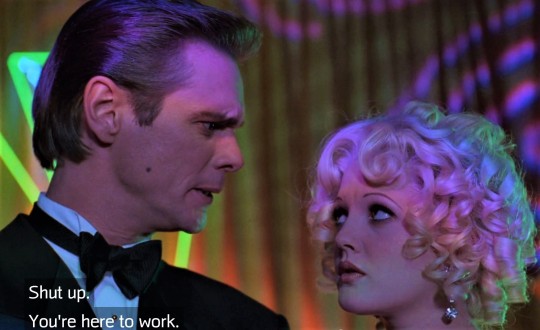
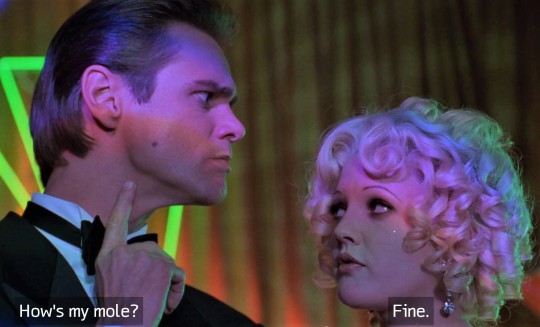
As for what makes him feel better, two obvious high points of his self-esteem right off the bat (lol) are when Bruce is giving him positive attention in his intro scene, and directly afterwards when he’s murdering his boss for ragging on him.
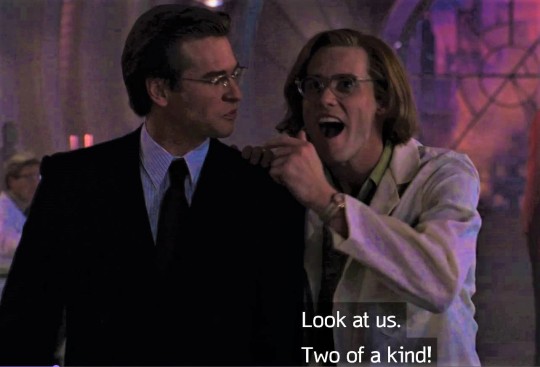

Of course, neither external validation or murder is, like, a permanent solution to insecurity. Obviously. If they ever got together Bruce would probably make him go to therapy, which would be incredibly hypocritical because, as Dr. Meridian points out in this movie, that’s not exactly something Bruce is doing. Although in Bruce’s defense, if you count the novelizations as canon for this continuity, the psychiatrist Alfred hired for him as a child basically wrote him off as a lost cause that was going to inevitably self-destruct at some point in adulthood. So I can see why he’d think therapy isn’t for him.
"Young Bruce may seem quite the stalwart, but there’s still a child beneath that veneer of calm acceptance [...] The day will come when that veneer crumbles, and the boy reacts to the memory of his ordeal. Such matters may be postponed, but not indefinitely. And the longer this one is delayed, the greater the damage will be to his psyche.”
“Still,” Alfred pressed. “How do you think this will all come out? Off the record, if you prefer.”
Another pause. “I am not terribly optimistic,” the stout man admitted. “But I assure you, I will do my best.”
Alternatively, Bruce just lets Edward borrow his clothes and calls it a day. It’s less time consuming than therapy and both the movie and novelization demonstrate how into that Edward is.
He was murmuring to himself, “We’ll probably be dining at Wayne Manor together.” He envisioned Bruce sitting across from him, and began to launch into a narrative [...] “Yes. Yes. A Party in my honor? I should have rented a tuxedo. What?” he couldn’t believe it, “One of yours, Bruce?” He gave it a moment’s thought and then shrugged. “Why not? We are the same size.”
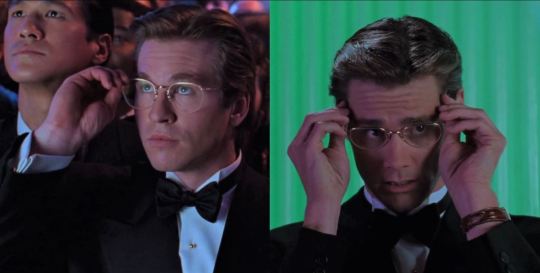
3. Who is the most romantic?
Uh, not Bruce! Batman Forever is the most thoughtfully romantic he gets in the entire series, and even here his only two dates ideas are “whatever Gotham social event my secretary tells me I need a date for” and “coming on to my date in my alternate identity to see if she loves me enough not to cheat on me with Batman.” Also, he vacillates between staunchly refusing to do any flirting at all and dishing out the least romantic pick-up lines possible.
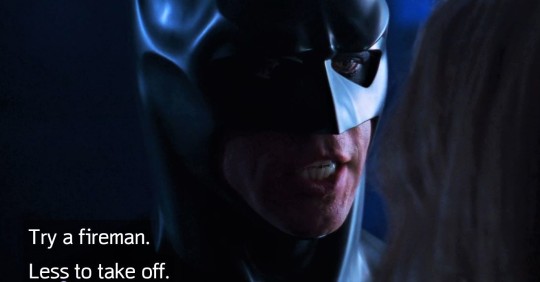

You say “bad writing,” I say “totally in character for a hot rich guy who knows that this is as hard as he has to try to get into someone’s pants.” Bruce might love his partner with the intensity of a thousand dying suns, but he’s still sending Alfred to buy all their Valentine’s Day presents. His idea of a romantic evening for two is finally trusting someone enough to tell them his secret identity. If he’s done that already, or they already figured it out, then his playbook is over. That’s clearly the only romantic fantasy he’s ever allowed himself.
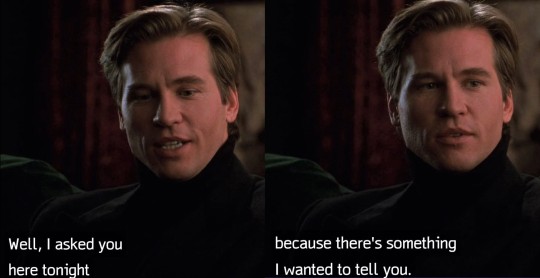
(I was going to say he does this once every movie, but he actually never does this in Batman & Robin specifically because he doesn’t actually care about Julie Madison. She proposes to him and he gets her name wrong while shooting her down. Add that to the “Bruce Wayne isn’t romantic” box.)
The ridiculous amount of magazine cut-outs populating Edward’s apartment indicates that he probably has a very vibrant and extensive set of fantasies involving Bruce, which is hinted at a couple times in the novelization.
Edward would certainly know him when he saw him. He’d spent enough time anticipating the moment, after all [...] Finally he was going to be meeting Bruce Wayne face-to-face, and he had every moment of the encounter scripted [...] He’d rehearsed it to perfection in his mind for weeks upon months.
In the grand scheme of things... in the fabulous, sweeping, intertwining destinies of Bruce Wayne and Edward Nygma, such a slip would not even rate a footnote.
He becomes suddenly and painfully aware that if Bruce Wayne walked away without Edward Nygma by his side, then that would be it. It would be finished. All these weeks, months... indeed, a lifetime of planning... and it was crumbling under him just like that.
Of course, that doesn’t necessarily mean his fantasies are all romantic in the traditional sense of the word. This is a man who was charmed by Harvey holding a charity circus hostage with some kind of graffitied missile warhead. Tonally, there’s not even that much of a difference between his crush collages and his riddle death threats.
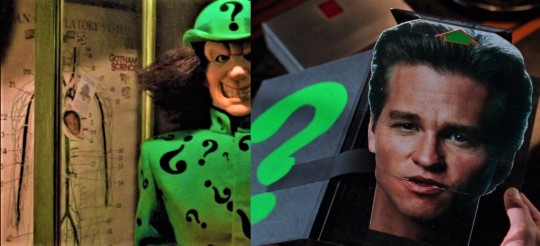
What’s weirder, using a magazine cutout of someone you hate to make a pop-up card of their face, or using a magazine cutout of someone you love to replace the anatomically correct heart in the cardiovascular system diagram you keep in your apartment/arcade/makeshift laboratory? Probably the former, since it was made with the express purpose of Bruce actually seeing it. Although presumably Edward was planning on taking Bruce to his apartment at some point? And in the novelization, he actually drags Bruce into his cubicle to look at his Wayne Shrine.
He grabbed Bruce’s arms and shouted “No, don’t leave me! I need you!” [...] Bruce was thunderstruck as he was pulled partway into Edward’s office... and then he caught sight of the shrine.
Edwards’s head bobbed eagerly. Now, finally, Bruce would understand the depth of Nygma’s devotion to his idol. He would see how important he was to Nygma.
Notably, the only thing that upsets Bruce about the fact that one of his employees has a serial killer wall dedicated to him at their work station (@heroes-etc: realistically.... IS this the first time this has happened? i doubt it.) is the fact that the shrine includes a picture of him taken directly after his parents’ death, which is obviously a huge trigger for Bruce’s PTSD.
Wayne’s gaze zeroed in on the picture of himself as a young man.
The eyes of Wayne the elder locked with Wayne the younger, and when he slowly turned his scrutiny back to Edward Nygma, Edward could feel the temperature in the cubicle drop to subzero.
Later, once Bruce isn’t being actively reminded of the most traumatizing day of his life, he reflects that he could probably relate to Edward’s specific brand of crazy, and hopes that it’s not too late to try again (it is).
He paused momentarily at Edward Nygma’s cubicle, thinking about the intensity he’d seen in the man’s eyes the other day. Nygma’s ideas might have been a bit odd, but that sort of passion—if properly channeled—could accomplish miracles. That was something Bruce Wayne certainly knew better than anyone else. Perhaps after this fiasco was the time to take Nygma aside under less-pressured circumstances. Start again...
With any other character, I would call bull on their being this unphased by someone being obsessed enough with them to build a stalker shrine, but, like. It’s Batman. He probably has a stalker shrine to Michelle Pfeiffer Catwoman in his cave somewhere. When they start dating, Edward mails the weirdest magazine cutout valentines to his office on the regular, and every time Bruce has to assure his staff that it’s not a ransom letter and it’s just “his boyfriend being romantic.”

9. What is the most embarrassing thing they have done in front of each other?
I mean, by most people’s standards, any one of the things that Edward does in front of Bruce could easily be the most embarrassing thing to happen to them in their lifetime. But for the most part, Edward seems blissfully free of that kind of self-consciousness. He accidentally introduces himself to Bruce as “[extended moaning sound] Bruce Wayne” and shakes it off without even registering his mistake. Even when he feels like Bruce has rejected him and his project, his emotional state is more shocked, saddened, and angry than it is ashamed. He does apologize to Bruce, during the scene where they first meet, for holding on to his hand too long during their handshake. And by “handshake” I mean that Bruce extends his hand to be shaken, and Edward just grabs on and holds it without any motion whatsoever for the entire first half of their conversation. Which might be the only time he ever apologizes in the entire movie. So I’ll say that was his moment of embarrassment.
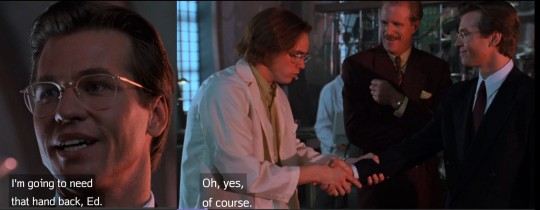

Bruce only really embarrasses himself in front of Alfred, but Edward does manage to trick Bruce into getting scanned by his mind reading device at the Nygmatech party. Being tricked in general would be pretty awkward for Bruce, since this movie goes out of its way to show the audience how SMART and CLEVER and KNOWLEDGEABLE ABOUT BRAINWAVES Bruce is at every opportunity. But being tricked into getting your mind read is about a million times more embarrassing than just running into a wall like some kind of Looney Tune. Obviously having access to Bruce’s mind allows Edward to figure out that his former boss/current obsessee is Batman, but also it’s just got to be super weird in there. Bruce is a bizarre man.
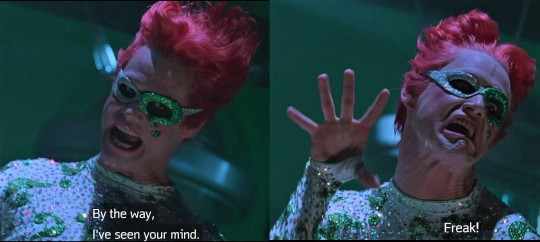
12. What first changes when it starts getting serious?
Whether he’s idolizing Bruce or plotting his destruction, Edward is still seeing the subject of his lifelong obsession as a larger than life exaggeration of the real man. Some of that pedestal would probably survive into the beginning of a romantic relationship, but by the time they got serious Edward would have had to recognize that Bruce has both positive and negative traits. He would also have had to grapple with the fact that the man he once assumed would make everything in his life better is a lot of work to be around, especially in this movie’s continuity where the trauma of his family’s death and his guilt over allowing enemies like Joker to die are genuinely affecting Bruce’s day-to-day functionality.
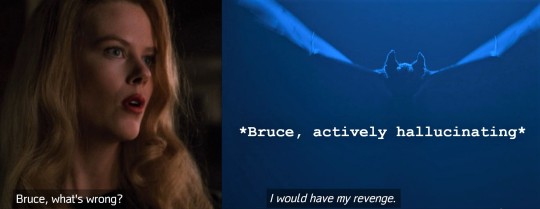
(A lot of things, Chase.)
Edward’s introduction scene demonstrates that he doesn’t see Bruce as having these kinds of problems. His Escapism Wish Fulfillment Device TM is clearly a very personal project for him, since he, you know. Is kind of already living in a Bruce-centric fantasy world.
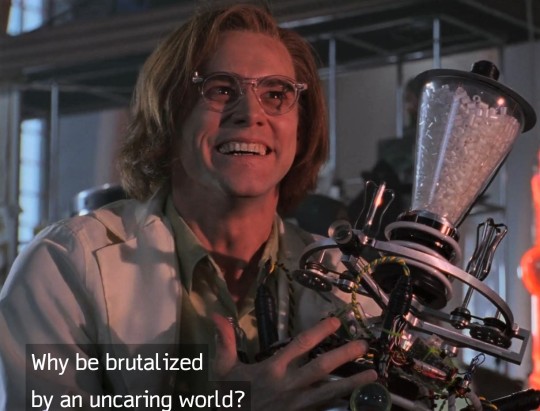
When he’s pitching it to Bruce, however, he states that he doesn’t think someone like Bruce would ever need to escape reality (which could just be ingratiating flattery, but he barely seems aware of what he’s saying at the time because he’s too busy staring with his mouth open at Bruce putting on glasses).
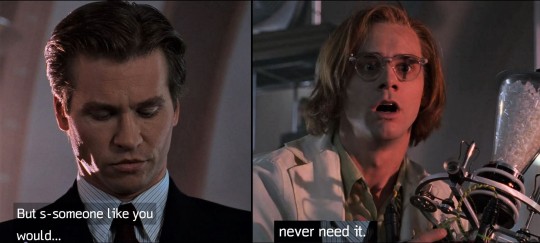
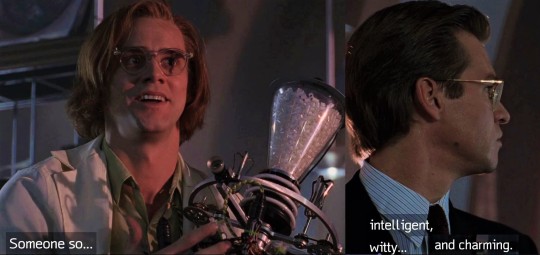
(Side note: an interjection from @heroes-etc
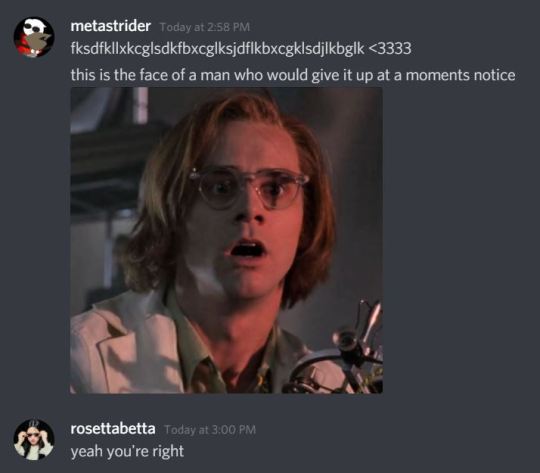

Anyway, moving on.)
Obviously we know he’s wrong, since Bruce escapes his reality every night by dressing up like a bat and scaring people. Normally that’s just subtext (or me being cynical and creating subtext), but Batman Forever introduced a hot psychiatrist who is constantly poking at Batman for being a power fantasy created by a traumatized mind to cope with intense feelings of helplessness in childhood.
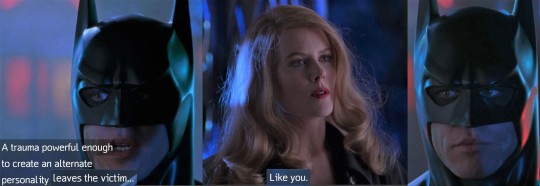
The novelization makes it clear that it’s not the illusion of perfection that Edward is attracted to, however. The picture of Bruce in Crime Alley is what kickstarts Edward’s obsession, not because Bruce seemed flawless but because he seemed to be going through similar pain as Edward (whatever Edward’s pain even IS in this continuity). So I think recognizing Bruce’s issues would be less of a dealbreaker and more of a point of connection, were they to get serious.
He saw, there in Bruce Wayne’s face, an intensity that mirrored his own. An anger, a frustration at the hand that fate had dealt him. There were no tears on Bruce’s face. Instead there was a smoldering intelligence that Edward intuitively sensed was on par with his own.
There was something in Bruce’s eyes, something in that gaze. There was Bruce, in a moment of raw emotion, his parents just having been cruelly taken from him. And there was no self-pity. Just cold, hard anger.
[...] Ed still had the newspaper with him when he was walking home from school. Not that he needed it to read; the contents were safely locked away in his skull, thanks to his photographic memory. But he wanted to clip out the articles and pictures about Bruce Wayne. He found the young man fascinating, as if he had discovered a soulmate of sorts.
For Bruce, on the other hand, getting serious presumably just means attempting to include Edward more and more in the found family he builds in the latter half of the 90’s Batman movies. Alfred approving a love interest is not quite as tantamount in this continuity as it is sometimes (Micheal Gough Alfred is pretty laid back), but Bruce is still spending all of his non-Batman, non-socialite time with his butler. So if Edward wants to hang out with Bruce, he has to either get on Alfred’s good side or prepare for a lot of “romantic quality time” where his boyfriend’s dad is glaring at him from the background.

Dick is less important to get on the good side of, since he and Bruce argue all the time in these movies (apparently one of the proposed scripts for Batman & Robin was Bruce kicking Dick out of the house and making him go to college, where Dick would cope with his dad-related anger by bullying his psychology professor Dr. Crane into becoming a supervillain. I personally feel like I deserved to see that Scarecrow origin). So if Dick doesn’t like Bruce’s new boyfriend, it’s just one more thing for them to be catty to each other about.
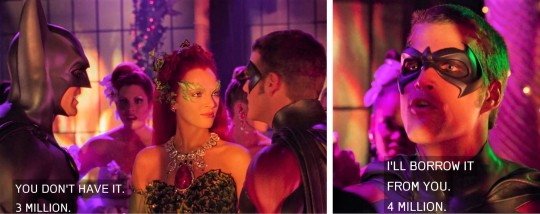
Alfred’s niece Barbara Wilson on the other hand (who is adorable as a fusion of Barbara Gordon and Julia Pennyworth, do not @ me) would be absolutely vital for Edward to win over, because her opinion could easily either make or break his standing with her uncle. Also Bruce decided to adopt her within five minutes of meeting her, so he’s obviously fond.
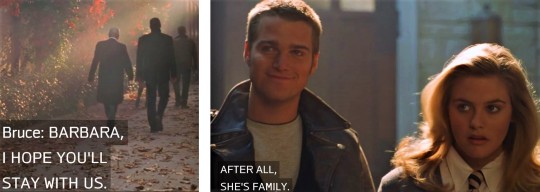
19. Where do they go on their first date?
Edward’s fantasy sequence in the novelization makes it obvious enough that he would really, really like to have dinner at Wayne Manor. Hanging out at someone’s house isn’t really a traditional first date, especially if one of you is a billionaire who could have taken you literally anywhere, but clearly none of that matters to Bruce, because that’s exactly the first date he invites Vicki Vale on in Batman (1989).

It’s pretty painfully awkward (“You want to know the truth? I don’t think I’ve ever been in this room before”) until Bruce gives up on the formality and takes her down to eat the rest of their courses with Alfred in the kitchen.

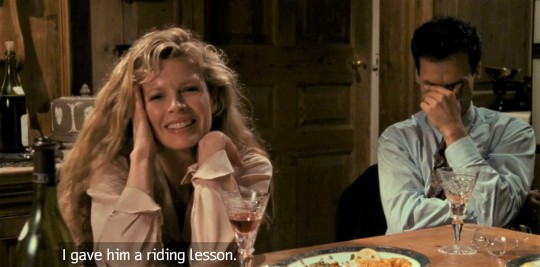
I feel like his first date with Edward could probably go the same way, with a few major differences. One, Edward would have been super enthused about eating in the fancy dining hall, and Bruce would have only suggested finishing their meal in the kitchen because Edward clearly wanted to see As Much Of The Manor As Possible. Two, when Alfred offers to stop embarrassing Bruce and leave them alone for the end of their date, Edward would have insisted he stay and break out the baby albums. You cannot convince me that Alfred is not a scrapbooker. Actually, does what Edward’s doing count as scrapbooking? Maybe they could compare notes.

#riddlebat#batman forever#edward nygma#riddler#bruce wayne#batman#ship meme#i do not actually recommend reading the novelization because it did chase so dirty i still seethe about it sometimes#but it did make edward pretty fucking gay#now the batman & robin novelization i recommend wholeheartedly#because for some reason bruce has a huge crush on mr. freeze#like literally bruce stalked him for a while in his 20's#and his internal narration is constantly monologueing about how handsome victor is#truly george clooney batman is canon gay
53 notes
·
View notes
Text
“…Since the deaths of individual women during actual battles or sieges were rarely mentioned, accounts of massacres offer some the best evidence as to why women were killed and also serve to illustrate the problems encountered in medieval depictions of violence. We might begin by considering the comparatively high number of massacres perpetrated by the army of the First Crusade, which has led to this crusade being perceived as a particularly notorious case of Christian brutality and religious intolerance.
At first glance, much of the killing seems to have been very indiscriminate and ruthless in nature, affecting men and women alike. Upon the crusade army’s capture of the Muslim city of Ma‘arrat al-Nu‘man in 1098, for instance, it was written that the Christians ‘killed anyone, man or women, whom they met in any place whatsoever’. Again, after the capture of Albara that same year Gilo of Paris wrote that old women and young girls were among the ‘thousand [who] were slain in a thousand different ways’. Although these accounts emphasise the slaughter, Hay has argued that chroniclers had reason to exaggerate the extent of the slaughters in order to present the crusaders as purifying and cleansing the Holy Land of the Muslim influence, and that they sometimes failed to distinguish in their narratives between the killing of adult men and non-combatants such as women, when in fact the latter were often held captive instead.
The sources for the Jerusalem massacre of 1099, for instance, describe the brutal and indiscriminate slaughter of its inhabitants once the city was taken and emphasise the extreme nature of the slaughter. This massacre is not itself surprising given that it was standard medieval military practise to kill the inhabitants of any cities which fell by force after a siege. Where the confusion arises is Albert of Aachen’s assertion that another massacre occurred three days later, in which prisoners who had been spared previously for the sake of money or pity, including women of all ages, were executed ruthlessly in order to prevent them rebelling if an external threat to the city emerged.
Although Albert is the only source for this second massacre, his testimony nevertheless suggests that the first instinct of the crusaders may have been to spare the inhabitants rather the kill them outright, despite what the other sources say of the crusaders’ zeal for blood; moreover, it is known that there actually were some captives ransomed at Jerusalem. Similarly at Albara and after the fall of Caesarea in 1101, Hay contends that while some sources ostensibly suggest a total slaughter, the language used by the chroniclers suggests that they were in fact referring only to adult men who were killed, and while some women probably did meet the same end, most of the women and other male non-combatants did not suffer the same fate.
Furthermore, Strickland has suggested that the First Crusade army must have been aware of the concept of non-combatant immunity that was taking hold in Western Europe at that time (as set forth in the Peace of God legislation), as well as chivalric conventions developed among the Franco-Norman warrior aristocracy which stressed, amongst other things, the taking of captives rather than the outright slaughter of defeated enemies. He does not, however, speculate on whether this had any moderating influence on the actions of the crusade army toward enemy women. In any case, while women undoubtedly made up some of those massacred on this crusade, it is worth keeping these factors in mind when considering the chroniclers’ depictions of wholesale killing.
Nevertheless, even if massacres were sometimes exaggerated, there is no doubt religious differences were still used on occasion to justify the killing of women. Women in heretical movements, such as the Cathar movement that flourished in southern France, were among those massacred by the armies of the Albigensian Crusade after they captured the cities of Béziers in 1209 and Marmande in 1219, as part of efforts to root out the Cathar heresy, although the number of people who died at either city, let alone the number of women, is unclear. Marvin speculates that the number of people killed was in fact not as large as other historians have made out, though he concedes that hundreds, if not thousands, may still have died. Again at Montségur in 1244, women were among the roughly 200 perfecti (the leaders of the Cathar hierarchy who were allowed to preach) massacred by yet another crusade army – gender again being no protection, since all who embraced Catharism were seen as heretics.
Perhaps the clearest statement of religious intolerance, however, can be found in the account, given by the Rothelin continuation of the chronicle of William of Tyre, of a French attack on the Muslim camp at Mansourah in 1250, during the Seventh Crusade:
Our men charged in through the Turks’ quarters, killing all and sparing none; men, women and children, old and young, great and small, rich and poor, they slew and slashed and killed them all. If they found girls or old people it did them no good to shriek and cry and beg for mercy, they were all slaughtered...It was sad indeed to see so many dead bodies and so much blood spilt, except that they were the enemies of the Christian faith.
The author here stresses the brutality and indiscriminate nature of the killing and almost appears to sympathise with the victims due to the scale of the slaughter. Lest he feel any compassion though, the author reminds us of that the victims were not Christians, thereby justifying the slaughter of women as well as other non- combatants. This justification, which simultaneously excuses and explains the violent nature of the attack, suggests that in fact numerous women were killed, particularly as it provoked the Turks into an equally ruthless counter attack on those Franks involved in the massacre after they later became dispersed.
Religion thus appears to have offered one basis upon which the killing of heretical and non-Christian women could be rationalised whilst also avoiding any ecclesiastical censure for not protecting non-combatants from the violence of war (since the Peace of God legislation only applied to warfare between Christians). Aside from religious intolerance, the desire for retaliation against perceived injustices seems to have been another reason why gender offered women no respite from the killing. Pope Urban II’s inflammatory speech at Clermont in 1095, for instance, which sparked the First Crusade, included remarks designed specifically to arouse pity as well as anger for the suffering endured by Christians in the East at the hands of the Muslims, and can, as Asbridge has suggested, help account for the general brutality displayed by this crusade towards the enemy.
In a similar manner, the killings witnessed during peasant rebellions in the fourteenth century did not discriminate based on sex, and were also motivated by the desire to address perceived grievances. Following the Battle of Cassel in 1328, which marked the end point of the peasant rebellion in Flanders against French rule, French cavalry apparently put men, women and children to the sword on a wide scale as revenge for their disastrous defeat at the Battle of Courtrai in 1302. Similarly bloody was the Jacquerie uprising in northern France (1358), vividly described by chroniclers who struggled to come to terms with the violence that was directed against the noble class. Jean Froissart, for instance, included horrific scenes of peasants capturing, killing and sometimes raping the wives and daughters of knights, simply because they were part of the noble class. Froissart clearly had little sympathy for the plight of peasants, and his account was undoubtedly coloured by his class bias, but there is little doubt it was a violent event.
Even in the work of Jean de Venette, who came from a peasant background and generally displayed more sympathy towards the lower classes in his account, peasants are still described as having ‘killed, slaughtered and massacred without mercy all the nobles whom they could find...and, what is still more lamentable, they delivered the noble ladies and their little children upon whom they came to an atrocious death’. Notwithstanding Venette’s obvious disapproval of the slaughter and the likely exaggeration in his descriptions, it is clear that noblewomen were specifically targeted by the rebellion just as much as noblemen.
Finally, women were sometimes simply massacred as part of a broader military strategy of indiscriminate slaughter and general devastation of the land. Such actions were designed to cause economic damage and strike fear into the enemy populace. The Scottish raids on northern areas of England during the twelfth century fit this category; many men and women were killed as a result of these raids, although again in such cases it is hard to separate out the experience of women from that of men. What is evident, however, is the hysteria generated by English chroniclers who saw the Scots as merciless in their treatment of English women. Henry of Huntingdon, for instance, claimed that the Scots ‘ripped open pregnant women’ and killed their children by throwing them on lances.
Similarly, Richard of Hexham, writing around the middle of the twelfth century, asserted that the Scots ‘murdered everywhere persons of both sexes, of every age and rank... [including] women pregnant and in childbed, infants in the womb, innocents at the breast, or on the mother’s knee with the mother’s themselves... [as well as] worn out old women’. Though certainly graphic, passages such as these must be treated with care, for many of the Anglo-Norman chroniclers who wrote of such events seem to have regarded the Scots as little more than excessively cruel and savage barbarians, barely above the level of beasts.
This xenophobia undoubtedly influenced the sensationalised (and most likely exaggerated) descriptions of women shockingly mutilated along with their children. Nevertheless, there is probably some truth to reports of Scottish cruelty in war, for both Richard of Hexham and others such as Jordan Fantosme, who described a separate indiscriminate Scottish massacre in the village of Warkworth in 1174, receive confirmation from other sources. Regardless of how many women were actually killed though, the point is that gender alone was no barrier to a broad strategy of slaughter, just as gender did not prevent women suffering from acts of revenge or religious intolerance.”
- James Michael Illston, ‘An Entirely Masculine Activity’? Women and War in the High and Late Middle Ages Reconsidered
#warfare#james michael illston#history#crusades#cw: islamophobia#cw: rape#peasants#medieval#high middle ages#late middle ages
7 notes
·
View notes
Text
ok so 2ha. vague spoilers ahead (important spoilers are warned but watch out)
that’s a solid 4.5/5 for me. this novel RUINED me and I loved it for it. it made me feel like very few novels (and even stories in general) did. today I’m STILL shaken over a part of it that I read two days ago, despite the happy ending. I have A Lot of thoughts (shout-out to @whateverwuxian who can testify that I couldn’t shut up about it, love you buddy!!) so I just went ahead and [gestures below]
starting with the negative so we can enjoy all the positive later. feel free to discuss but I’m extra sensitive and these are only my personal feelings so they probably won’t change anyway, so be nice please!
what I didn't like:
too many r*pe scenes. I get that the non-con """makes sense""" narratively and thematically but like. they didn't have to be explicit. at the very least not all of them. sorry but too much is too much. there are more non-con sex scenes/flashbacks than consensual sex scenes! stop! we get it! enough now!
not a fan of a 26yo falling in love with a 16yo. if cwn had initiated Anything I would’ve thrown the novel out the window. but thankfully it didn’t happen, I got invested, and nothing mutual happened until mo ran was 22, so I mostly got over it, but I’m still somewhat uncomfortable with it for very personal reasons.
their first time putting it in. it felt so unfair and I was very upset over it. it could’ve worked without going There? why. was that necessary. and it's heartbreaking for both of them, because mo ran didn't want to do it either. he wanted them to take all their time. he wanted to go step by step. all he wanted was to make sure cwn would be happy and comfortable and never hurt again in bed. for their first time that way he wanted it to be special. but it was just. taken away from them, and for what? for nothing there’s absolutely no reason for it. I get there’s the metaphorical foreshadowing of the upcoming reveal aspect (spoilers) both of them not consenting, mo ran being horrified -> the reveal that mo ran was cursed and so would’ve never wanted to treat cwn like this in the past either if he’d had control (end spoilers) but still?? and it’s never brought up again? I know they don’t get the time until the very end but hhhh. yeah I have Feelings over this
some plot twists hit good emotionally but had no point? thinking of the one about xue meng here.
there’s horny, and then there’s mo ran. it’s not a bad thing, it’s just not the kind of stuff I like reading about and book 1 and 2 are A Lot on that side so in book 2 after a while ME, THE BIGGEST ASEXUAL WHO COULDN’T CARE LESS ABOUT SEX SCENES, WAS LIKE, “oh my god have mercy please just fuck already I beg of you” and indeed they chilled a bit after that. like they were still horny but. less intensely and less all the fucking time. thank god (I still think the farm arc was hilarious to witness though, and I did love it)
kinda wish their reunion at the end was longer and more emotional but that’s just because I love that shit
(spoilers) kinda wish we got to see shi mei again before he went off doing his blind wandering doctor stuff. a talk with ranwan would’ve been very interesting. (end spoilers)
xue meng didn’t get a hug
that one thing at the end you know the one. maybe I'd be more into it if it'd been given time to be explored seriously and wasn't played off as a joke. it kinda ruined the mood of their last scene for me. (spoilers spoilers spoilers this is the end of this section if you don’t want to get spoiled) in that scene I wanted chu wanning to ride off into the sunset with mo ran, not txj. like, txj is the alternate world’s “if there had been no transmigration” version of mo ran 2.0. the whole point is that mo ran IS txj in book 1, but changes and becomes mo ran 2.0. mo ran 2.0, who by the end of the novel has already done all the redemption and deconstruction of his dubious habits. who he was as txj is long behind him. at this point txj will always be a part of who he was, but they are pretty much two 'different' people now. txj disappearing into dust after everything that happens at the end was beautiful symbolism. it meant something. to me there was no point keeping txj around after all that other than for “haha split personalities fighting over cwn’s attention uwu” THAT SAID the fact I'm not a fan of the idea doesn't mean I don't like txj. I care txj a lot and have Emotions over him, and I will definitely eventually explore this in my writing
(still spoilers) the demonic blood reveal was a bit.... deus ex machina? plus I personally would've preferred mo ran staying a regular person (end spoilers)
alright what I liked now:
the themes, both regarding the characters and the various plot elements. this novel really challenges your morals and what you think is right or wrong, what’s redeemable, what’s punishable, and how much one relies on first impressions, amongst other things. this novel is the definition of “don’t judge a book by its cover” but also “look further than the first page” in so many ways
the romance. like I don’t need to say anything there. just, the slow burn, the longing, the yearning, the romance [clutches heart]
the plot twists/reveals. I’m so glad I was barely spoiled (I was spoiled two Big things but very vaguely so I was still surprised) because pretty much all of them had me shouting “WHAT” and/or gaping and/or various “what the fuck!!!”/”holy SHIT”/“NO” reactions
the way a lot of those reveals just completely change your view on things/characters?? that’s my jam
wontons. that was the first time I cried and my first very physical reaction to an event in this novel. I literally felt like time froze. I heard my heart beating. it was painful but AMAZING.
might be nothing in the grand scheme of things but honestly, all the food! I love that mo ran is an excellent cook and can make all those delicious dishes for cwn. as someone who loves to cook for their loved ones I think it’s so lovely that he gets to do that
the character growth. for everyone, but mo ran in particular? like I just. I started off not liking mo ran very much, straight up despising him at times, and in the end I was fucking sobbing over him and cried myself to sleep only to wake up in the middle of the night to cry some more so there’s that
chu wanning? there were aspects of him that I related to heavily, and that felt both like the Mortifying Ordeal of Being Known and very special because it doesn’t happen to me that often
the whole deaging arc. that was deaging done right and it had a purpose in the narrative and their relationship growth, I was “!!!!”
I LOVE how they took their time with EVERYTHING once they got together? that it spanned over several weeks? that it started with the confession, then just holding hands, then kissing, then making out, then sex, and even the sex was step by step! it said A LOT about mo ran’s character growth and it respected SO MUCH the fact that cwn is a 32yo (unrelated but (spoilers) I like to argue that yeah he’s been alive for 32 years but when you’ve been asleep and not aging physically nor growing mentally for five years in a way that makes you a 27yo. so when he calls his body “mature and old” and compares himself to shi mei I’m just. buddy your body is just three years older than shi mei’s there’s barely any difference in maturity right there. I know it’s your lack of self-worth speaking, and believe me I get it, but don’t be so hard on yourself. (end spoilers) anyway, this is an unimportant and unrelevant thought that I had during the mirror scene) who has no experience in any of these things whatsoever. he's not pushed into sex like he's going to be comfortable right off the bat and like it isn’t such a big change in a life that’s been ascetic so far. mo ran is aware of that! and when they have their first time mo ran, who’s been maybe even more horny than cwn all this time - seriously horny is that guy’s middle name, who initiated the sex, what does he say!!! "don't worry about me, tonight, I just want to make you feel good"??? mo ran?? your character development??? I appreciated that so much.
the pain. I’m still bleeding on the floor despite the happy ending but yeah. I like angst and I was not disappointed. it didn’t feel that gratuitious to me, more like, brutally honest? I don’t cry that easily but by the end I think I’d cried, what, close to ten times??
quite a few excellent quotes [lies down] “I realized - I had grown into the you in my heart”?? “hell is too cold”??? I highlighted more but those two are the ones that always come to my mind first
most of the time the flashbacks were perfectly inserted for maximum emotional damage and I respect that skill
xue zhengyong. like he’s not my favourite, my favourites are xue meng, nangong si and ye wangxi but? I just adored him so he gets a special mention
the side characters? like, I legit loved Everyone? when I cry over side characters you know it’s serious
THE CONFESSION SCENE. LIKE. HOLY SHIT MY HEART. it comes reaaally close to the vocal one (because hua cheng confesses so many times without words) at the end of tgcf for me. it was beautiful. I was so emotional. the fact that cwn can't say it no matter how much he feels it. like it's always been plain and clear just how much he loves mo ran. but he can't say the words yet and I just. the fact that mo ran gets it? that he doesn't need the words, just that squeeze of fingers, just what cwn is, at that moment, able to give him, and it doesn't mean less to him than words would? it hit home real hard
unless I think of something else, that’s about it! I can’t recommend 2ha enough, that said, I beg of you, heed the warnings. they are NOT overstated. and even if there were no warnings, take care anyways. the angst is serious, it haunts you. angst always makes me feel like my chest is being squeezed and that’s precisely the feeling I’m looking for when I choose to read angst. I have good tolerance to it, so despite not doing entirely well lately, I thought I was tough and went for it, but I’m a CLOWN. the way it’s written ruins you. this morning despite reading the hardest part of the angst on saturday evening, I still had some physical chest pain. so I recommend it with all my heart, but take care of yourselves. 2ha doesn’t fuck around.
#2ha#bee talks#i will probably tweak and add to this post over time because I probably forgot stuff#anyways I'm gonna go lie down and cry over ranwan as I think about my fic ideas#2ha review
66 notes
·
View notes
Text
Ai yah, I really have to respond to this post again, huh?
Well, for starters, I apologize for a mistake I made in my original post. In the OP, I insinuated that the Princess Zeldas we see in the series could have possibly had a role in the atrocities committed by the royal family. This is incorrect, and it was poor wording on my part. I should have clarified my intentions when writing that particular passage; however, I felt it was unimportant, given that the point wasn’t solely about Princess Zelda, but how the addition of the Goddess Hylia and the Demon King Demise not only invalidates Ganondorf’s character up to that point, but adds much greater weight to the terrible actions committed by the royal family, especially towards the Sheikah.
Given that tumblr user lorelylantana is the third person to make a reply by discussing the reincarnation cycle, rather than the actual point of my post, perhaps I should have proofread and double checked my post before sending it out into the world to cause problems on purpose.
With that said, after I read lorelylantana’s response, I felt it necessary to make a proper reply of my own. It’s going to be a rather lengthy reply, as I have many things to say and many images to post.
However, I’m going to do all that I can to avoid discussing fanon or fan theories. I don’t mind them, but adding fanon wasn’t the point of my original post, and it shouldn’t have been the focus of the responses I received. I want to stay as close to the canon Nintendo laid out as possible. Thusly, my sources will strictly be drawn from the games, game manuals, Creating a Champion, Hyrule Historia, and Hyrule Encyclopedia. Despite the latter two being dubiously canon, they were approved by Nintendo, so they’re worth mentioning.
So, without further delay, let us begin.
- “The original post seems to be based on the idea that Zelda and the royal family of Hyrule are synonymous, which is questionable for reasons I’ll get into later.”
For all intents and purposes, yes. Zelda and the royal family are synonymous, as she is the face of the royal family in almost every Zelda game featuring her. Even if she isn’t the ruler of Hyrule in that particular moment, she is our figurehead for the monarchy, by all means.
- “The games don’t hand wave the actions of Hyrule’s royal family, they just don’t go out of their way to hold a young girl personally responsible for the actions of kings […]”
While the actions of the royal family are briefly acknowledged, as is the case with the Shadow Temple and the Arbiter’s Grounds, the monarchy has never had to answer for their actions. Even in the case of the Sheikah’s massive exile 10,000 years ago, the royal family never answers for this, nor are they ever portrayed being in the wrong. In fact, the event in question is only mentioned by a single member of the Sheikah in Breath of the Wild, Cado.

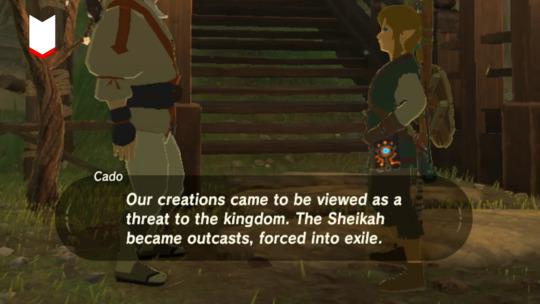
Image credit goes to YouTube user Macintyre.
The royal family’s actions are never directly described as “these were horrible things that happened.” Instead, it’s simply, “yeah, it happened.” There is no acknowledgement that the Yiga was created by the royal family’s own hands, nor is there any emphasis placed on the impact any of these acts have.
For example, the exile of the Sheikah wasn’t even the first instance of the royal family of Hyrule mass-exiling a group of people and displacing them from their original homes.
After the events of Ocarina of Time, Ganondorf is captured and executed for his crimes leading up to the events of the game and presumably the events of the Adult Timeline, given Young Link’s testimony. (I’ll get into why the King of Hyrule believes Link over Zelda later.) After Ganondorf was executed, the Gerudo were forced out of Gerudo Valley and banished from the Haunted Wasteland. Even during the events of Twilight Princess, the Gerudo Desert is completely abandoned. Once again, there is no discussion concerning the royal family’s actions, with the narrative instead being that the Gerudo, some of whom were actively against Ganondorf’s actions and many of whom were hypnotized during the events of OoT, are entirely at fault and have to atone for their sin of… having Ganondorf for a leader, I suppose.

Source: Creating a Champion, p. 405
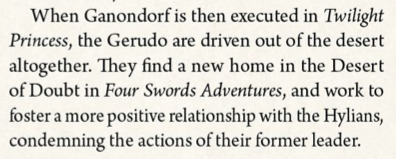
Source: Hyrule Encyclopedia, p. 46
The royal family gets to punish an entire people for the actions of one man. Rather than the act being portrayed as negative or even discussed, it’s hardly even mentioned.
While I’m aware Encyclopedia’s canonicity is dubious at best, its material was still approved for publication by Nintendo. Thusly, I feel it worthy to discuss.
To summate, the royal family did bad things, and very select few acknowledge it.
Next point.
- “I think that the Zelda/Hylia = good Ganon = bad situation serves a narrative purpose that justifies the black and white nature of the games because it highlights the shades of gray in between installments…”
The Legend of Zelda is almost thirty-five years old. This series should have long evolved beyond the black-and-white-morality narrative, especially when the side we’re supposed to sympathize with literally used the Sheikah to commit war crimes. You don’t have to have stark white and pitch black in order to see shades of gray.
- “… And trying to assign Zelda a dark side is kind of missing the point, especially when no one seems to question Link’s morality even though he’s constantly stealing people’s stuff.”
Examples of Consequences to Link Stealing People’s Stuff
1. In Twilight Princess, stealing from Trill will result in the bird branding you a thief and pecking you every time you come near him, which will only cease when you finally pay up.
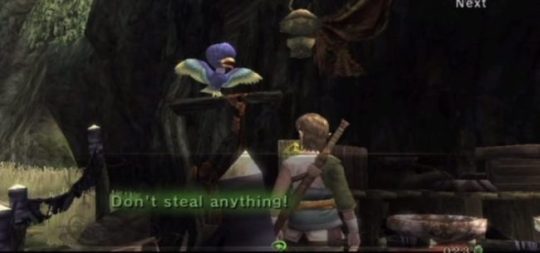
2. In Link’s Awakening, stealing from the old man’s shop will result in instant death the next time you enter his shop. If you steal, your name is changed to THIEF for the rest of the game.

Furthermore, Link is controlled by the player; thusly, his actions have no consequence to the story or Link’s character. Zelda, on the other hand, is an active participant in the story, whose actions and whose family’s actions weigh heavily on the games. That’s not to say Zelda is ever evil. However, as much as she is a victim of her own family’s history, she still has just as much power to change it.
- “If the games wanted to gloss over the sins committed by the royal family[,] they wouldn’t have designed entire dungeons around them.”
I reiterate: the sins of the royal family were mentioned once, and then immediately dropped shortly thereafter. It’s not there for you to dwell upon, merely window dressing as if to say, “Yeah, that happened.”
- “I believe The Legend of Zelda series is a critique of the Divine Right of Kings”
Until the events of Skyward Sword, the Hylian Royal Family wasn’t a divine lineage. A thirty-five-year-old series can’t be a critique of a concept that it barely even acknowledges. The only emphasis placed on the “goddess blood” part of the royal family is in Breath of the Wild, in relation to Zelda having to unlock her sealing powers. Despite the massive repercussions the revelation of the royal family’s lineage tying back to divinity should have, it’s barely even mentioned,let alone discussed.
As a side note, the divine right of kings specifically denotes that the monarch is chosen by God to rule. In contrast, the Hylian Royal Family continues to rule by, presumably, claiming lineage to the Goddess Hylia, which is closer to traditional practice in feudal Japan.
- “If the Divine Right of Queens is indeed present, does that justify a hereditary monarchy? As far as the Legend of Zelda is concerned[,] the answer is no.”
The Legend of Zelda series never questions the validity of the royal family’s rule.
- “Isn’t it funny that the Kingdom of Hyrule seems to be perpetually stuck in the dark ages?”
Ocarina of Time has neon lights, jukeboxes, and canned goods. The lakeside doctor’s chemistry is advanced enough that he is able to synthesize eyedrops. Given the newspaper articles strewn about shops, Hyrule also has pictoboxes in OoT.

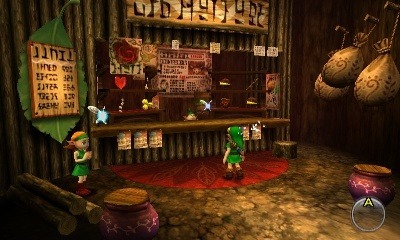
By Wind Waker, pictoboxes have evolved to print in color. In Phantom Hourglass, Linebeck’s ship is steam-powered.
In Twilight Princess, pictoboxes now print higher quality images. In addition, with the introduction of Malo Mart’s Castle Town branch, TP is confirmed to have fully functional electrical lighting in some places. Cannons are so safe, you can get launched out of one for fun. Pyrotechnics have grown advanced enough that explosives can function underwater, and Death Mountain has become a functioning, refined mining facility stable enough for Hylians to safely walk in. Also, Auru has a bazooka.
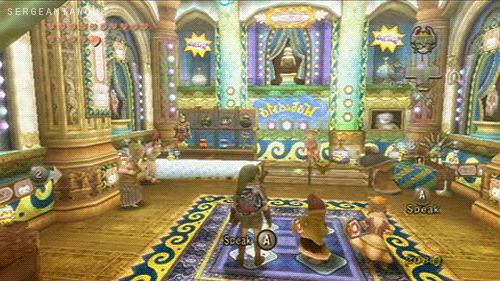
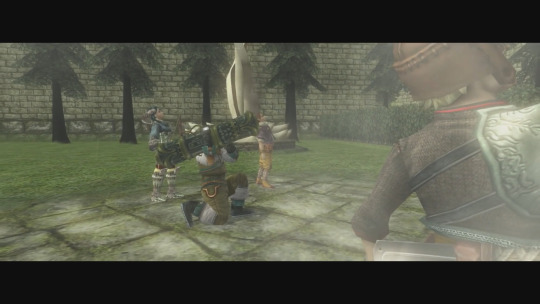
SPIRIT TRACKS HAS TRAINS. THEIR AESTHETIC DIRECTLY REFLECTS THE INDUSTRIAL REVOLUTION.
Hyrule is hardly stuck in the dark ages. It’s high fantasy.
Next point.
“For starters, I want to establish that I don’t agree with the assumption that what the Hyrulean Royal Family does = Zelda/Hylia would do. I don’t think it’s a mistake that almost every text in the OP explicitly mentions that it was a King that committed those acts, not Zelda herself.”
Once again, that was an error on my part. It wasn’t my intention to imply Zelda had any part in such actions. However, Zelda learns how to rule from her father, or her mother, or whomever holds the throne in that particular moment. These acts are never questioned in canon beyond “Yeah, that happened,” and the most conflict we have is the issues between Zelda and her father in Breath of the Wild boiling down to how to confront the Calamity—science vs. sealing magic— rather than anything else.
It’s a personal issue, and Rhoam treats Zelda terribly, essentially alienating himself from his own daughter and treating her as little more than a pawn. I agree that it’s absolutely terrible. However, that’s merely a personal issue. She’s complicit in how Rhoam addresses the Sheikah, possibly even fully aware of the anti-aging rune Purah was developing to force retired soldiers into battle against the Calamity, and from what we’ve seen in Age of Calamity, she doesn’t have an understanding of the Yiga Clan other than the snide remark Urbosa gives:

Image credit goes to YouTube user BeardBear.
It’s up to Zelda to develop a deeper understanding of her country’s history; not to take personal responsibility, but to understand where those who are suffering are coming from.
That said, acting with the Hylians’ best interests at heart is exactly something Hylia would do.
In the prologue to Skyward Sword, the Demon King and his army attack the Hylians, slaying many and throwing the world into despair. Thus, the Goddess Hylia saves the Hylians by sending a chunk of land up into the heavens, sparing them from the war to follow while she gathers every other race to fight alongside her.
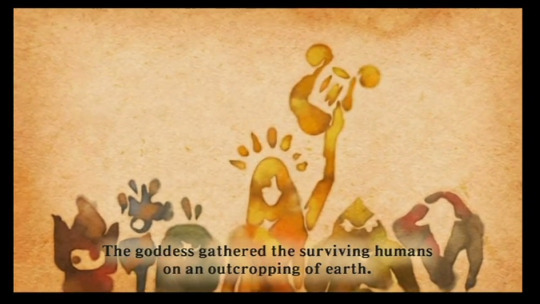
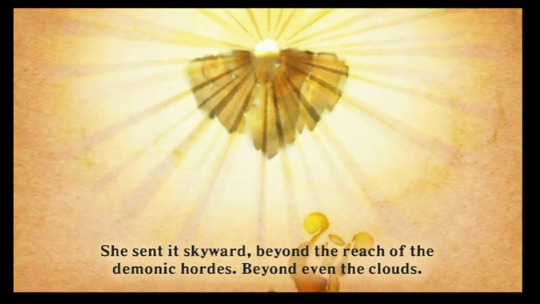

So… How come Hylia only saved the Hylians?
I understand many were wiped out by demons, but if Hylia was fully prepared to spare people from violence, why not also send small numbers of every other race? Why only save the Hylians, her chosen people, while essentially dragging everyone else into battle with her? Furthermore, when Hylia’s immortal body suffered grave injuries, she opted to take advantage of this by choosing to be reborn as a person. Not only is it explicitly stated that Hylia reincarnated in order to utilize the Triforce’s power, as she could not do so as divinity, but she knowingly chose to be reborn as someone who would become close with her chosen hero, in order to influence him to follow her plan without hesitation.
Hylia used Link.
That much is certain, and it’s laid out clearly by Zelda shortly before she takes Hyrule’s longest beauty nap.
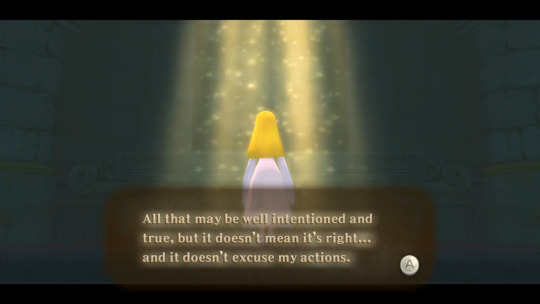
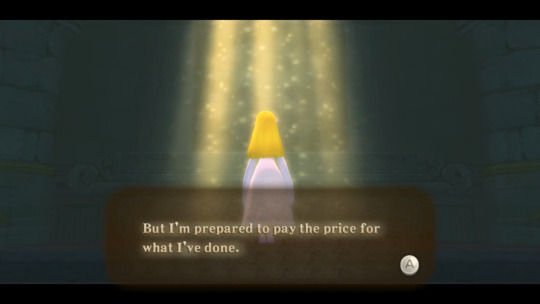

It must be noted that while Zelda states she is Hylia reborn, and has regained Hylia’s memories by this point, she still sees herself as a separate entity from Hylia. While she herself is immensely guilty and apologizing over and over for what she’d done in her previous life, we have no way of knowing if Hylia herself would react the same way.
In fact, according to a fan-translation by ZeldaUniverse user Yamikawa, Demise goes as far as to describe Hylia as “brave and so-prideful,” hinting that even a being who loved her chosen people so much to save them still saw them as beneath her, if being reborn as human is seen as such a drastic extreme contradictory to her supposed character. Now, this is merely reflection on the inner workings of the Demon King, so his word can’t be taken as gospel. But, like all things, I find it interesting.
From what I can gather, however, Hylia certainly cared more about the Hylians than any other being in the land of Hylia, not dissimilarly to the royal family.
- “I also don’t think that every princess Zelda is a Princess of Destiny or Representative of Hylia, I think that she reincarnates just about as often as Link and Ganon(dorf) do, because the logistics don’t really work out otherwise. This leaves hundreds, if not thousands of years where Zelda/Hylia isn’t on the throne.”
This is merely speculation. Moving on.
- “There’s a notable trend of the King of Hyrule getting in the way of Zelda’s attempts to save the kingdom. First[,] he doesn’t take Zelda seriously [in] Ocarina of Time, forcing her to rely on Link […] I don’t know why the King of Hyrule was willing to listen to a random boy claiming to have been from the future over his own daughter but whatever I guess.”
The King of Hyrule believed Young Link because he came back to the Child Timeline with the Triforce of Courage. Up to that point, the whole Triforce was supposed to be safely locked away in the Sacred Realm, which was supposed to be completely inaccessible without the spiritual stones and the ocarina of time, neither of which Link had. I’d listen to the kid’s story too if he came back with a God Dorito on the back of his hand.

- “And then again in Breath of the Wild when Rhoam bans Zelda from ancient tech research despite the fact that he has absolutely no reason to believe his pray the incompetence away method is the right one.”
The tapestry showcasing the events from 10,000 years ago depicts a princess possessing the blood of the goddess using her sealing magic in order to seal away Calamity Ganon. Link can swing the Master Sword at Ganon or whack him with ancient arrows or light arrows all he wants. Without the ability to seal away the darkness, as shown at the end of Ocarina of Time, all of this preparation and planning would have been for naught. That is why Rhoam is so harsh on Zelda. That’s why so much emphasis is placed on unlocking her power. Without it, defeating Ganon would be impossible.
On that note, Rhoam also had no idea what he was doing. Zelda’s mother was the one with the sealing magic, not him. She was supposed to be the one to train Zelda, but she passed away before she got the chance to even start. He puts so much emphasis on prayer rather than ancient technology because he genuinely doesn’t know what else to do.
I can’t believe this post forced me to defend Rhoam of all people I’m gonna have a stroke—
- “Also, this is purely speculation, but [I’m] pretty sure there’s an implication that King Daphnes Nohansen caused the flooding of Hyrule in Wind Waker […] This sounds like a wish on the Triforce that backfired[,] but I digress.”
Daphnes couldn’t have made a wish on the Triforce before Wind Waker because, when the Hero of Time left the Adult Timeline, that timeline’s Triforce of Courage shattered into eight pieces and scattered throughout the land—er, ocean. Even if he had Wisdom on him, Ganondorf still possessed the Triforce of Power when he was sealed away, and he wasn’t going to let go of it when he broke free.
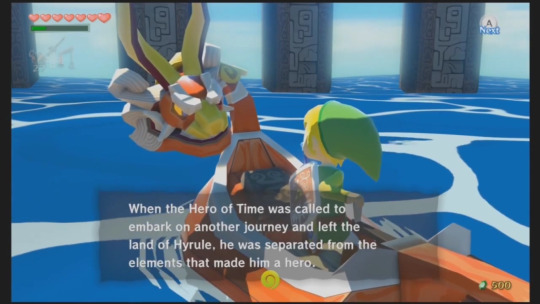
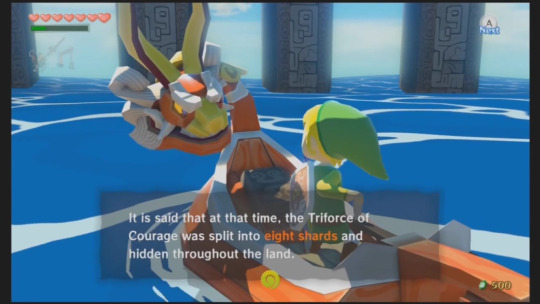

Besides, if Daphnes did wish on the whole Triforce, it would have disappeared. There would have been no Wind Waker.
- “When she saves Hyrule in spite of interference…”
I’m not even going to finish the quote because the entire paragraph is too much for me to unpack. I’m assuming they’re saying that Zelda is never the one truly in power, and the royal family takes advantage of one Zelda’s good deeds to get brownie points.
However, concerning the first line…
In Ocarina of Time, Zelda going behind her dad’s back to try to “save Hyrule” leads Ganondorf straight to the Sacred Realm. Even though a time paradox leads to everything turning out okay in the end, the bleak future was created because Zelda wanted to play hero and pulled Link along with her. Even if Ganondorf managed to wrench the spiritual stones away from the Zora and Gorons, he wouldn’t have been able to access the Sacred Realm if Zelda didn’t send Link there to pull out the Master Sword, which Ganondorf would have never been able to touch. By all means, Ocarina of Timehappened because a little girl was in over her head and tried to take matters into her own hands when her dad didn’t believe her.
Aside from Breath of the Wild, there’s no other “interference” from the royal family that Zelda has to face.
- “Zelda is the representation of a deity, so it makes sense that people would worship her to some extent, and having a goddess on the throne [probably] blesses the land. So[,] while the kings of Hyrule have a tendency to screw things over, [it makes sense] for Hyrule to be a monarchy because Zelda’s power as the goddess incarnate is needed to defend against Ganon and other threats, [r]ight?”
I acknowledge the author is attempting to portray the royal family’s possible justification for their rule. However, until I reached the succeeding passage, I believed it was the author making this justification, given how the entire paragraph preceding this was pure speculation. Once again, this passage is speculative, as nobody in Hyrule has ever explicitly given any notable opinion concerning the royal family. Why try to justify your rule when nobody’s criticizing it?
Since the author brings up Zelda being a representation of Hylia, however, it does bring to mind a particular problem I have with the royal family suddenly being goddess-blood.
It completely recontextualizes the relationship between the royal family and the Sheikah.
According to Creating a Champion, the Sheikah have a deep devotion to the Goddess Hylia. Since the royal family is descended from the goddess reborn, the Sheikah thusly are deeply devoted to the goddess Hylia.
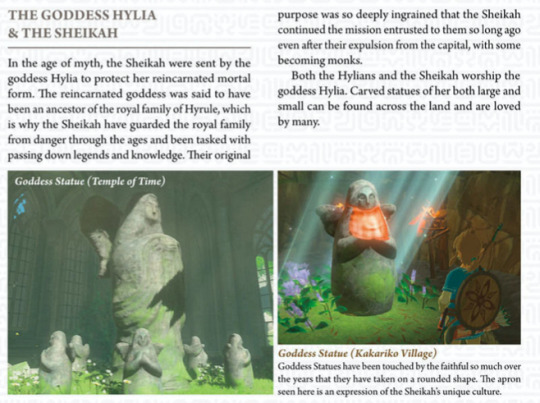
Source: Creating a Champion, p. 372
Now, the royal government using a minority group of people to do your dirty work is already scummy enough when you’re just a normal royal. In this case, however, the Sheikah are so devoted to their goddess that they will do anything for you. Whether it’s because certain monarchs are a “representation of a deity” remains to be seen, but the point is that they’ll do anything for you.
And the royal family takes complete advantage of a group of people unconditionally loyal to them, bidding them to do unspeakable things in the name of their religion, which for all intents and purposes is the royal family.
That’s absolutely deplorable, and it’s a wonder nobody’s brought attention to it yet, whether in-canon or in-fandom. What’s more, given how Impa is always Zelda’s attendant, this relationship is never questioned or criticized, whether it be by the Sheikah or Zelda herself.
And that’s terrifying.
- “The reason Ganon is always an antagonist is because he’s the vessel for the curse of Demise.”
Demise was introduced in Skyward Sword. Demise is the root of all evil, the creator of monsters and conjuror of demons. He is pure evil in every sense from the word, the Zelda series’ version of Satan. Naturally, he’s as simple as you can get in terms of character. Barebones characterization, providing only just enough to tell the player exactly what they need to know:
He’s evil, he’s powerful, and he wants the Triforce. You have to stop him.
Ganondorf existed before Demise. Ganon had over twenty years of development before Demise brought his progress to a permanent flatline.
Who was Ganon before Demise?
Allow me to remind you.
In The Legend of Zelda, first released on February 21st, 1986, Ganon is simply described as “the Prince of Darkness,” and steals the Triforce of Power when he invades Hyrule. After the Triforce of Wisdom is shattered, he kidnaps Zelda.
He’s evil, he’s powerful, and he wants the Triforce. You have to stop him.
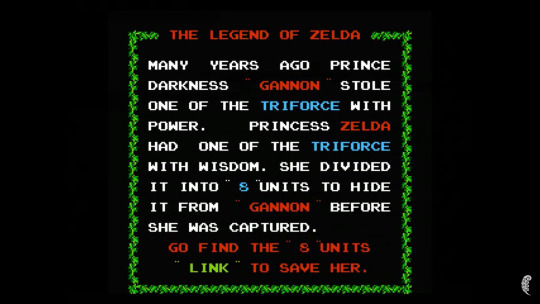
Although Ganon doesn’t physically appear in Zelda II: The Adventure of Link, released in 1987, his presence is still felt as his minions pursue Link in order to revive the Prince of Darkness. In fact, the game over screen is the successful revival of Ganon.

Now, given that these are the first two games in the series, it’s perfectly alright for Ganon to be as barebones as he was. After all, many villains at the time were the same way, with the most notable of Ganon’s counterparts being Bowser from the Super Mario Bros. franchise.
However, with innovation of technology comes innovation of narrative, and it’s with the release of A Link to the Past in 1993 on the SNES that we begin to see Ganon develop as a character. In the prologue to ALttP, Ganon is revealed to have once been human; he is given the name Mandrag Ganon—or Ganondorf Dragmire, as we now know him—and he was once the leader of a band of thieves who sieged the Sacred Realm and took control of the Triforce after murdering his own followers.
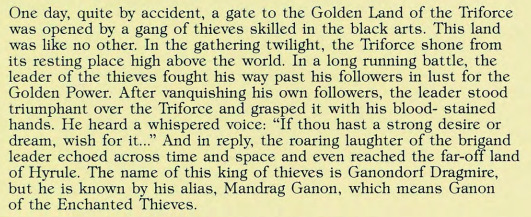


Source: A Link to the Past SNES game manual
Ganon is still irrevocably evil, but in this case, we begin to learn more about him. We begin to see a character starting to form. One who isn’t just mindlessly evil, but who has the charm and wit to infiltrate Hyrule Castle and earn the King of Hyrule’s trust in the guise of Agahnim. Ganon was also a very capable leader, having successfully led his band of thieves straight to the Triforce. Even after wishing upon the Triforce and corrupting the Sacred Realm, Ganon’s power attracted followers in the form of greedy, power-seeking people. He’s powerful not by brute force alone, but through his cunning use of intellect.
Ocarina of Time served to further develop Ganon in little ways. For example, this is the first game wherein, for the majority of the game, Ganon is seen and referred to by his human form: Ganondorf. Ganondorf is shown to be powerful enough and stealthy enough to infiltrate the homes of the Zora, the Gorons, and the Kokiri, and send dangerous hazards their way in an effort to seize the Spiritual Stones. At the same time, he is first seen at an audience with the King of Hyrule, as if there for diplomatic reasons.
Although Zelda sees Ganondorf as evil because of her prophetic dream, the King of Hyrule doesn’t believe her. Because of this, we can infer that Ganondorf has enough charm and charisma to, if not win over the King of Hyrule, not be seen as suspicious despite the horrible acts he’d committed, not just in the past, but at that very moment. He’s also shown to be highly cultured, shown at the end of Link’s ascent up Ganon’s Tower. Not only is Ganondorf playing his own theme, but he’s doing so on the pipe organ, which is notoriously one of, if not the most difficult musical instrument to master.
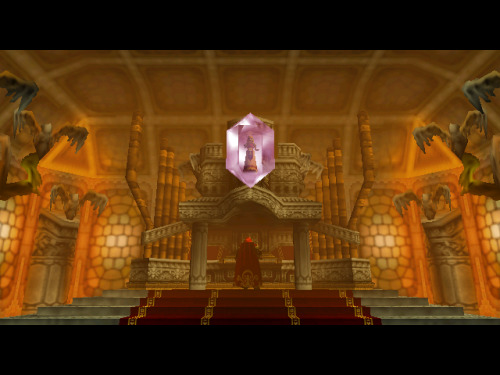
Once Ganondorf seizes the Triforce of Power, the kingdom of Hyrule is subjected to seven long years of his rule. During this time, normal people such as Ingo succumb to their greed and follow Ganondorf’s influence in pursuit of power and riches. Although Malon is naïve enough to believe Ingo was somehow under Ganondorf’s control, it’s clear to players that he was completely in control of his actions, and that Ganondorf’s rule brings out the worst in seemingly average people.
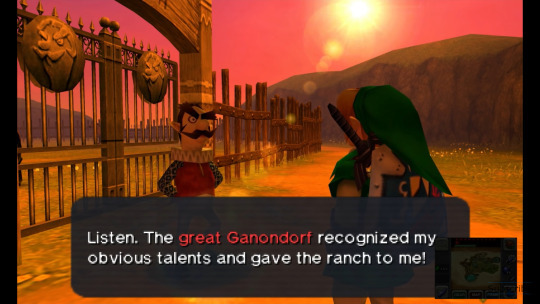
Image credit goes to YouTube user ZorZelda.
Even a Hylian knight can fall under this influence, with it highly inferred that the knight who once guarded a room of pots for Link to smash is now a twisted poe collector, the man even stating that he likes it better this way.
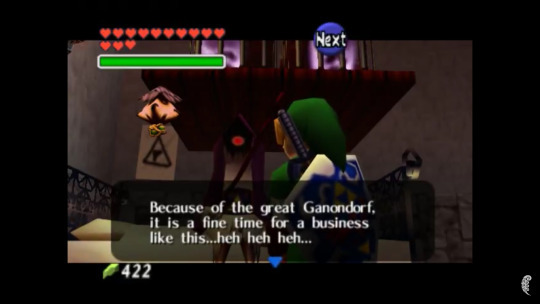
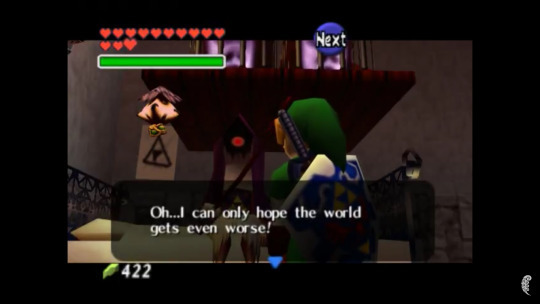
In Wind Waker, we finally see a more introspective side to Ganondorf. While he’s just as ruthless and fully ready to murder a child in the name of accomplishing his goal, he reveals the reason that started him on his path of darkness:
His people were suffering, and he wanted for his people what Hyrule had. He believed that taking Hyrule and taking the Triforce meant that his people could finally live freely, away from the harsh desert.
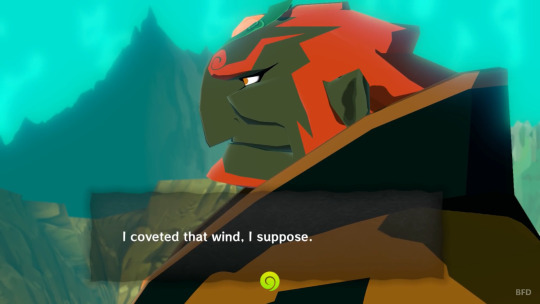
Now, I’ve seen this challenged time and time again. Was Ganondorf lying to distract or manipulate Link? Was he telling the truth? Is this what Ganondorf has convinced himself to believe, after so much time sealed away and in isolation? We will never know, and that’s part of what makes the game so interesting. Ganondorf’s portrayal is a large part of why so many people love Wind Waker, and it’s not hard to see why.
Perhaps the darkest the Zelda series has ever gone in terms of the Triforce’s power was in Twilight Princess. After freeing Lanayru, the Light Spirit warns Link of the dark power he seeks, the Fused Shadow. In order to do this, she explains the history of the Triforce, and the bloodshed brought by its allure to the darkness in the hearts of men. Before the construction of the Temple of Time, many battles were fought, and one of them was the “Interloper War” that inevitably resulted in the creation of, not only the Light Spirits, but the Twili and the Twilight Realm.
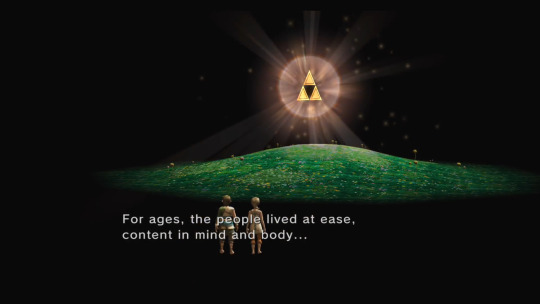

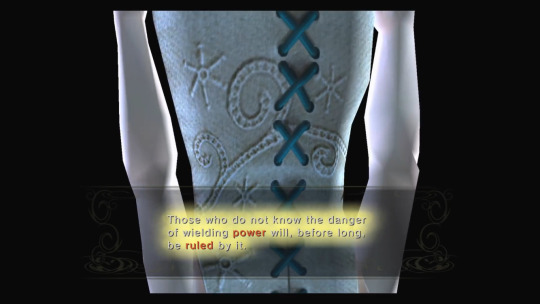
It’s important to note that Lanayru’s cautionary tale highlights that Link, the hero of the story, could succumb to the allure of the Triforce and dark magic just as easily as any other person. In this particular case, anyone could have fallen down the same path as Ganondorf. If anything, this tale is one of the most important bits of lore to take into consideration when discussing the series.
Anyone could have been in Ganondorf’s shoes. It could have happened to anyone.
Then, in one fell swoop, Skyward Sword ruined it.
In a single game, every bit of progress on Ganondorf is lost. Once again, we’re dragged down to the baseline characterization from the original game.
He’s evil, he’s powerful, and he wants the Triforce. You have to stop him.
Suddenly, everything the previous games had built up no longer matters. There’s no longer a need to question whether what Ganondorf did was solely out of greed, but also out of what he felt was necessity. There’s no need to wonder if Ganondorf was once a rational man, who succumbed to the irresistible pull of the Triforce like so many before him.
Ganondorf is, purely and simply, the reincarnation of Satan, so there’s no need to go any deeper than that.
And that’s why I hate this “vessel of Demise” thing. It completely undermines everything Ganondorf once was and reduces him to a single, cardboard cutout of a villain.
Moving on, before I get sad.
- “This curse is specifically tied to Hylia’s bloodline and the Link’s soul, which is pretty specific…”
Demise’s curse is essentially dooming the earth with a never-ending rebirth of his hatred; his malice, if you would. The wording of his curse is specifically “people like you,” which could mean that it isn’t Link and Zelda’s exact souls that are tied to his hatred. Rather, people possessing the blood of the goddess and a heroic, courageous soul are doomed to deal with this curse.
However, my thoughts on this matter are pure speculation.
Also, Demise specifically targets his curse at people like Link and Zelda because they were the ones to kill him in the first place. That much is obvious.
- “… [So] why do the clashes with Ganon always throw the fate of Hyrule into disarray? Because Zelda’s bloodline runs the country.”
Ganon would attack Hyrule even without Zelda’s family in charge. His pursuit of power and domination of the Triforce/Hyrule is therefore closely tied with the fate of Hyrule. Goddess blood on the throne has nothing to do with it.
- “If Zelda came from a small town the curse would probably manifest in peril for that one region which isn’t great but it’s better than an apocalypse.”
Firstly, this is a run-on sentence. Secondly, I reiterate: Ganon would attack Hyrule as a whole, regardless if Zelda’s bloodline was on the throne. It wouldn’t matter if Zelda’s whole family suddenly moved to the countryside. When Ganon inevitably comes back, he’s still gonna go straight for the Triforce or to conquer all of Hyrule. Goddess blood isn’t even part of the equation for Ganon. And if goddess blood isn’t there to stop him, then that’s even better.
Alright, so I’m not even going to bother gratifying the last two paragraphs of the response with an answer, because it’s all rambling that has nothing to do with the original argument. Relinquishing the throne would do nothing to right any wrongs dealt to the many people who were hurt, and evil doesn’t care about a single princess with goddess blood or a boy with a pointy stick.
In conclusion, the addition of Hylia made it so that the royal family’s power dynamic with the Sheikah is even more critically imbalanced than it originally was, making the exile of the Sheikah 10,000 years ago even more heinous than it originally was. Yet, because Hylia is portrayed as wholly good and incapable of doing wrong, despite in-game evidence to the contrary, the royal family, and Zelda by extension, will never be criticized for any wrongdoing. In fact, doing so may well be heresy, if the responses to my original post are anything to go by.
By comparison, the addition of Demise diminishes Ganondorf’s character, rendering him down from the makings of a complex, human character—where anyone could have easily been in his place and had the same greed and ambition for power—into simply the reincarnation of the literal devil, where of course he’s evil, and you don’t have to do any digging beneath the surface. Ganondorf is the reincarnation of Demise, or his hate, or his vessel, so he’s pure evil and nothing more.
And that’s the greatest disservice Nintendo has ever dealt to The Legend of Zelda.
#legend of zelda#ganondorf#princess zelda#breath of the wild#botw#loz#tloz#ocarina of time#twilight princess#zelda#link to the past#alttp#wind waker#ganon#the legend of zelda#hylia#goddess hylia#demise
46 notes
·
View notes